Climate Control
13 Strategies for Achieving Optimal Climate With Heat Pumps

We have found that heat pumps play a crucial role in attaining ideal climate management.
In fact, with the right strategies, we can enhance efficiency and comfort in our homes or businesses.
In this article, we’ll explore 13 proven techniques for maximizing the potential of heat pumps.
From selecting the right size and proper installation to regular maintenance and troubleshooting, we’ll guide you through every step.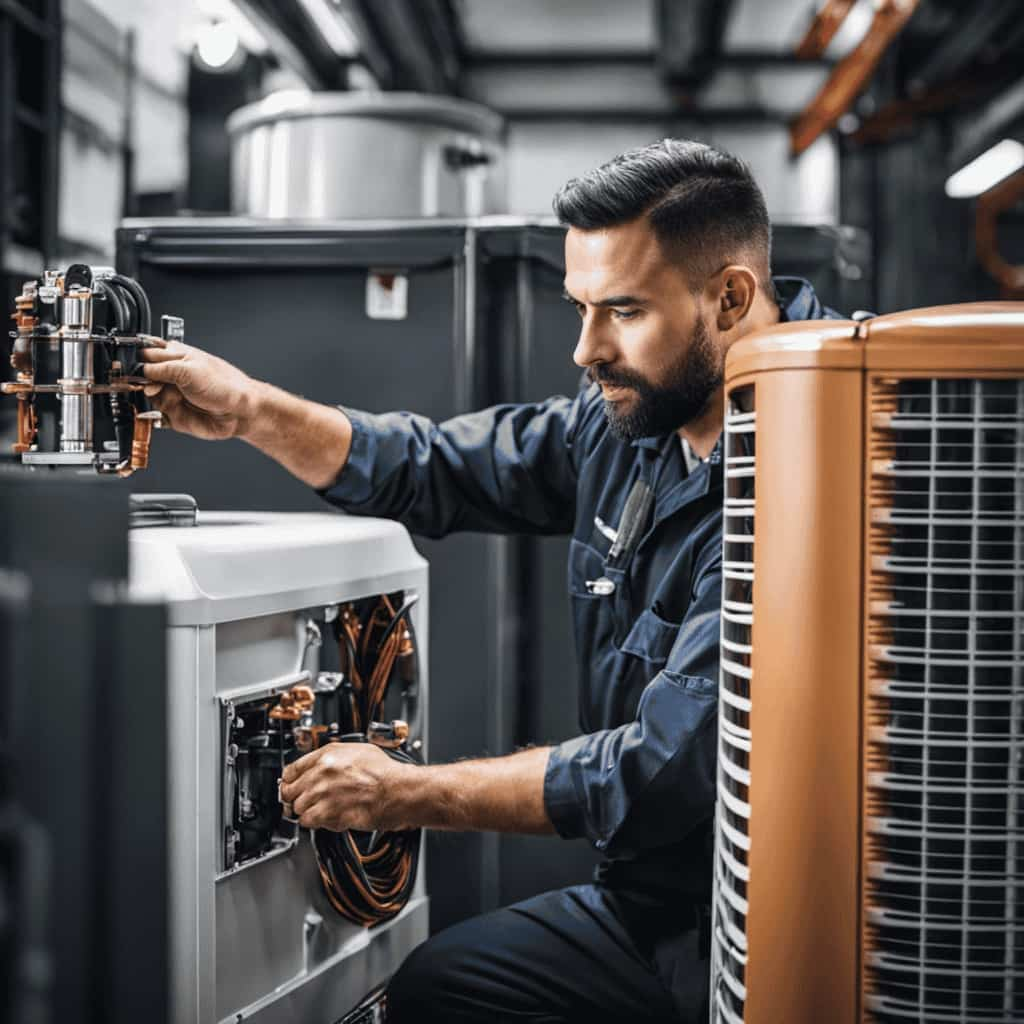
Get ready to transform your space into the perfect climate oasis!
Key Takeaways
- Understanding heat pump technology and thermodynamics is essential for efficient operation.
- Proper sizing, installation, and placement of heat pumps ensure comfort and energy efficiency.
- Regular maintenance and servicing, including cleaning filters and coils, and checking refrigerant levels, are necessary for optimal performance.
- Implementing ventilation strategies, optimizing airflow, and adjusting temperature settings based on preferences and climate contribute to achieving optimal climate with heat pumps.
Understanding Heat Pump Technology
As we delve into the subtopic of understanding heat pump technology, it’s important to grasp the fundamentals of how these devices work.
Heat pump efficiency is a key factor in the overall performance of these systems. Heat pumps operate by transferring heat from one location to another, using a refrigerant and a compressor.
The refrigerant absorbs heat from a low-temperature source, such as the air or ground, and then releases it at a higher temperature into the desired space. This process relies on the principles of thermodynamics and the properties of the refrigerant.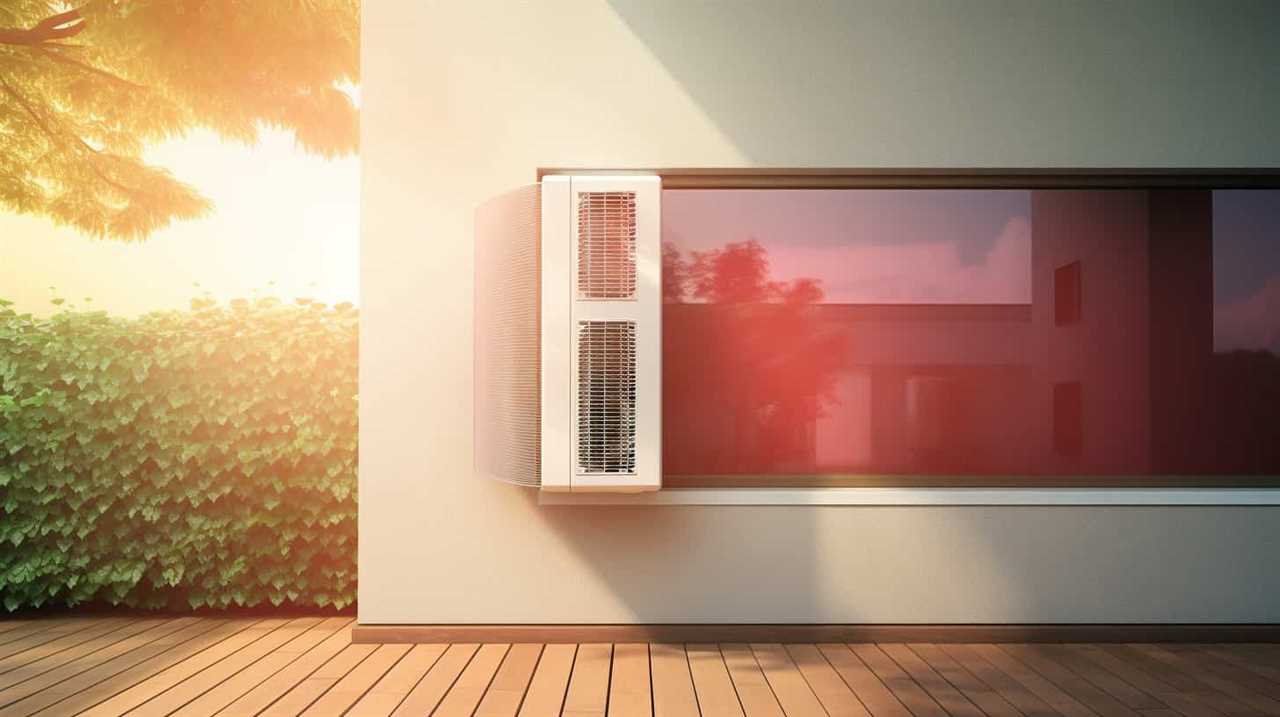
Understanding the operation of a heat pump is crucial for maximizing its efficiency and ensuring optimal climate control.
Now, let’s move on to the next section where we’ll discuss the important considerations in choosing the right size heat pump for your space.
Choosing the Right Size Heat Pump for Your Space
Our main consideration when choosing the right size heat pump for our space is ensuring that it meets our specific heating and cooling needs. Here are some sizing considerations and installation requirements to keep in mind:
Square footage: Measure the area you want to heat or cool to determine the appropriate size of the heat pump.
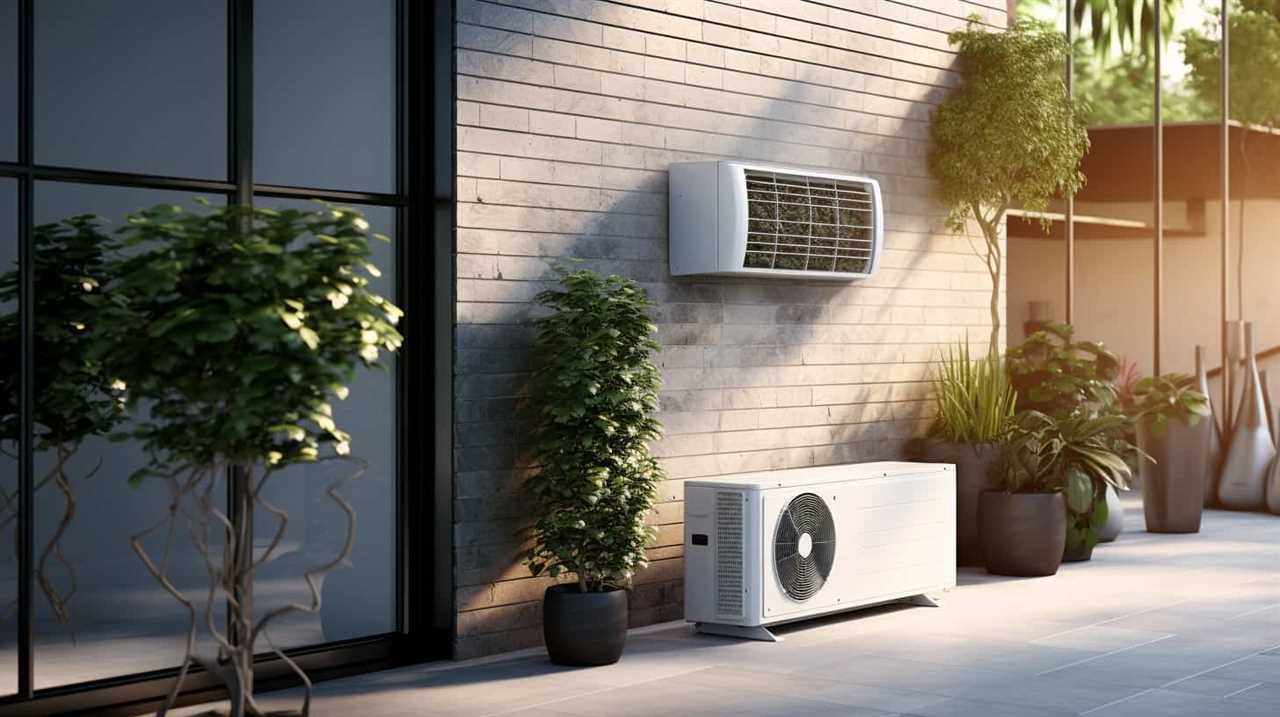
Insulation: Take into account the level of insulation in your space, as well as any drafty areas that may require additional heating or cooling capacity.
Climate: Consider the climate of your location, as it will affect the heat pump’s efficiency and performance.
Choosing the right size heat pump is crucial for optimal comfort and energy efficiency. An undersized heat pump will struggle to meet your heating and cooling demands, while an oversized one may cycle on and off frequently, leading to energy wastage.
In the next section, we’ll discuss the proper installation and placement of heat pumps to ensure their effectiveness and longevity.
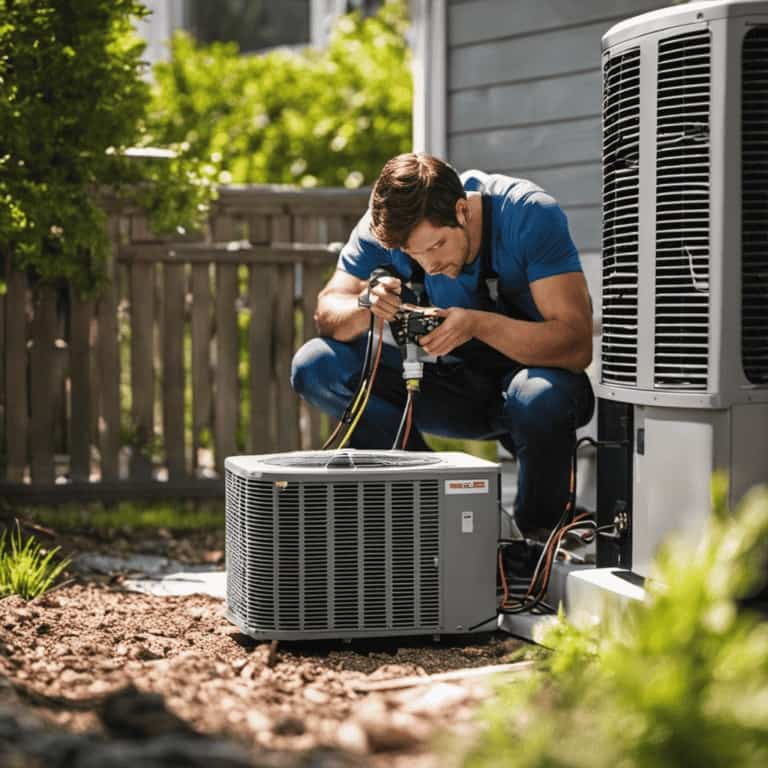
Proper Installation and Placement of Heat Pumps
We need to ensure proper installation and placement of heat pumps to maximize their effectiveness and longevity. Following installation guidelines and maintenance tips is crucial for achieving optimal performance. Here are some key factors to consider:
| Installation Guidelines | Placement Tips | Maintenance Tips |
|---|---|---|
| Hire a professional HVAC technician to install the heat pump. | Place the heat pump in a well-ventilated area. | Clean or replace the air filters regularly. |
| Ensure proper electrical connections and wiring. | Avoid obstructions around the heat pump unit. | Schedule annual inspections and tune-ups. |
| Properly insulate the refrigerant lines to prevent heat loss. | Keep the heat pump away from direct sunlight or extreme weather conditions. | Monitor the thermostat settings and adjust as needed. |
Regular Maintenance and Servicing of Heat Pumps
To ensure optimal performance and longevity, regular maintenance and servicing of heat pumps is essential. Here are some heat pump maintenance tips and the importance of regular servicing:
Clean and replace filters: Dirty filters can reduce airflow and efficiency of the heat pump. Regularly cleaning or replacing the filters is crucial to maintain proper air quality and prevent strain on the system.
Inspect and clean coils: Over time, the evaporator and condenser coils can accumulate dirt and debris, hindering heat transfer. Regular inspection and cleaning of these coils can improve energy efficiency and prevent system breakdowns.

Check refrigerant levels: Low refrigerant levels can cause the heat pump to work harder, leading to increased energy consumption and reduced cooling or heating capacity. Regularly checking and maintaining proper refrigerant levels is vital for optimal performance.
Regular servicing not only ensures the smooth operation of your heat pump but also helps identify and address potential issues before they become major problems. By following these maintenance tips and scheduling regular servicing, you can enjoy efficient and reliable performance from your heat pump for years to come.
Optimizing Airflow and Ventilation for Climate Control
For optimal climate control, it’s important to optimize airflow and ventilation within the space.
Airflow optimization involves ensuring that air is distributed evenly throughout the area, while ventilation strategies focus on removing stale air and introducing fresh air.
To optimize airflow, it’s crucial to consider factors such as the layout of the space, the placement of vents and registers, and the use of fans or ductwork to encourage air movement.
Additionally, proper ventilation strategies involve the use of mechanical systems such as exhaust fans or air purifiers, as well as natural ventilation methods such as opening windows or using trickle vents.
Effective Temperature Control Settings for Heat Pumps
When it comes to achieving optimal climate with heat pumps, it’s crucial to set the temperature within ideal ranges and implement energy-saving settings.
By understanding the ideal temperature ranges for different seasons and adjusting the settings accordingly, we can ensure both comfort and efficiency.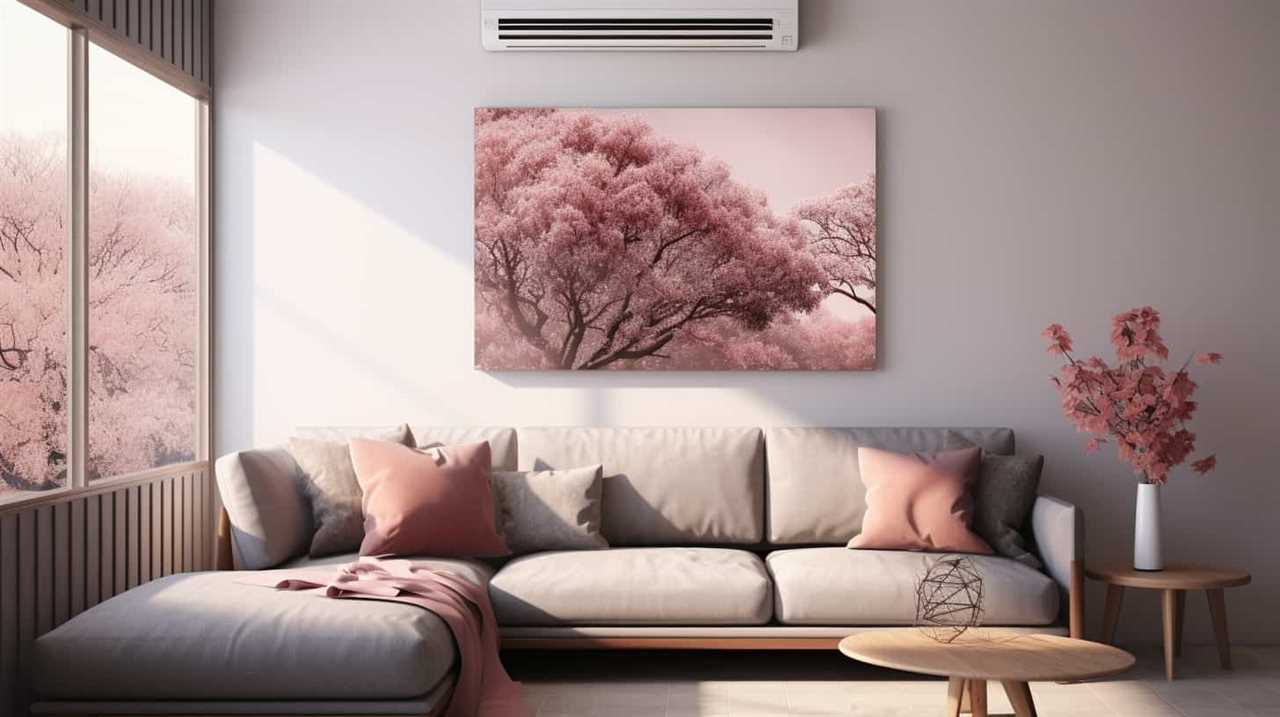
Additionally, utilizing energy-saving temperature settings, such as setback or programming features, can further enhance the performance and energy efficiency of heat pumps.
Ideal Temperature Ranges
We prefer setting the temperature range for heat pumps within a specific range to achieve optimal climate control. Maintaining the ideal temperature range is crucial for ensuring comfort and energy efficiency. Here are some key points to consider when setting the temperature range for your heat pump:
- The ideal temperature range for cooling is typically between 72°F and 78°F, while for heating, it’s usually between 68°F and 72°F.
- Setting the temperature too low or too high can lead to increased energy consumption and discomfort.
- It’s important to adjust the temperature range based on personal preferences and the climate conditions in your area.
By maintaining the ideal temperature range, you can create a comfortable indoor environment while minimizing energy usage.
Now, let’s explore how energy-saving temperature settings can further optimize the performance of your heat pump.
Energy-Saving Temperature Settings
Our recommended temperature settings for heat pumps can significantly reduce energy consumption while maintaining optimal climate control. To maximize energy savings, it’s important to set temperature limits that align with energy-saving tips.
During the winter, we suggest setting the heat pump to around 68°F (20°C) when you’re home and awake. Lowering the temperature by 7-10°F (4-6°C) when you’re asleep or away can further reduce energy usage.
Similarly, during the summer, setting the heat pump to around 78°F (25°C) when you’re home and raising the temperature by a few degrees when you’re away can help conserve energy.
By setting temperature limits in this manner, you can enjoy energy savings without compromising comfort.
Transitioning into the next section, utilizing programmable thermostats for energy efficiency can enhance your efforts in achieving optimal climate control while further reducing energy consumption.
Utilizing Programmable Thermostats for Energy Efficiency
One effective strategy for achieving optimal climate with heat pumps is utilizing programmable thermostats for energy efficiency.
Programmable thermostats offer several benefits that can help homeowners save energy and reduce their utility bills:
Customized temperature schedules: Programmable thermostats allow users to set different temperature levels for different times of the day. This feature enables homeowners to adjust the temperature based on their daily routines and occupancy patterns.
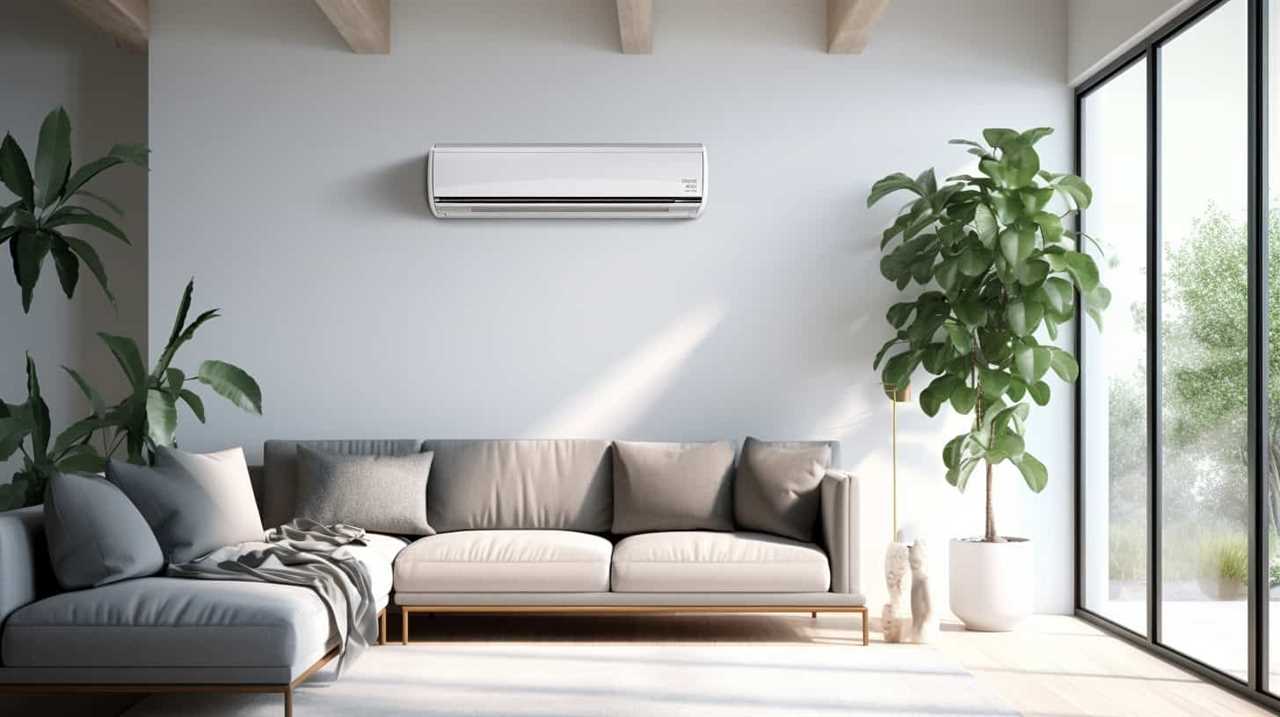
Energy-saving modes: Many programmable thermostats offer energy-saving modes, such as ‘away’ or ‘vacation’ mode, which allow users to set a consistent, energy-efficient temperature when they aren’t at home.
Remote access: Some programmable thermostats can be controlled remotely through smartphone apps. This feature allows homeowners to adjust the temperature settings even when they’re away from home, ensuring optimal energy efficiency.
Enhancing Insulation to Maximize Heat Pump Efficiency
To maximize heat pump efficiency, we can enhance insulation by using high-quality materials and sealing any air leaks. Maximizing insulation is crucial for improving energy efficiency and reducing heat loss in a building. High-quality insulation materials, such as fiberglass or cellulose, can be installed in walls, ceilings, and floors to minimize heat transfer.
Additionally, sealing any air leaks around windows, doors, and ducts prevents the escape of conditioned air and the entry of unwanted outdoor air. By enhancing insulation, we create a thermal barrier that helps maintain a consistent indoor temperature, reducing the workload on the heat pump and maximizing its efficiency.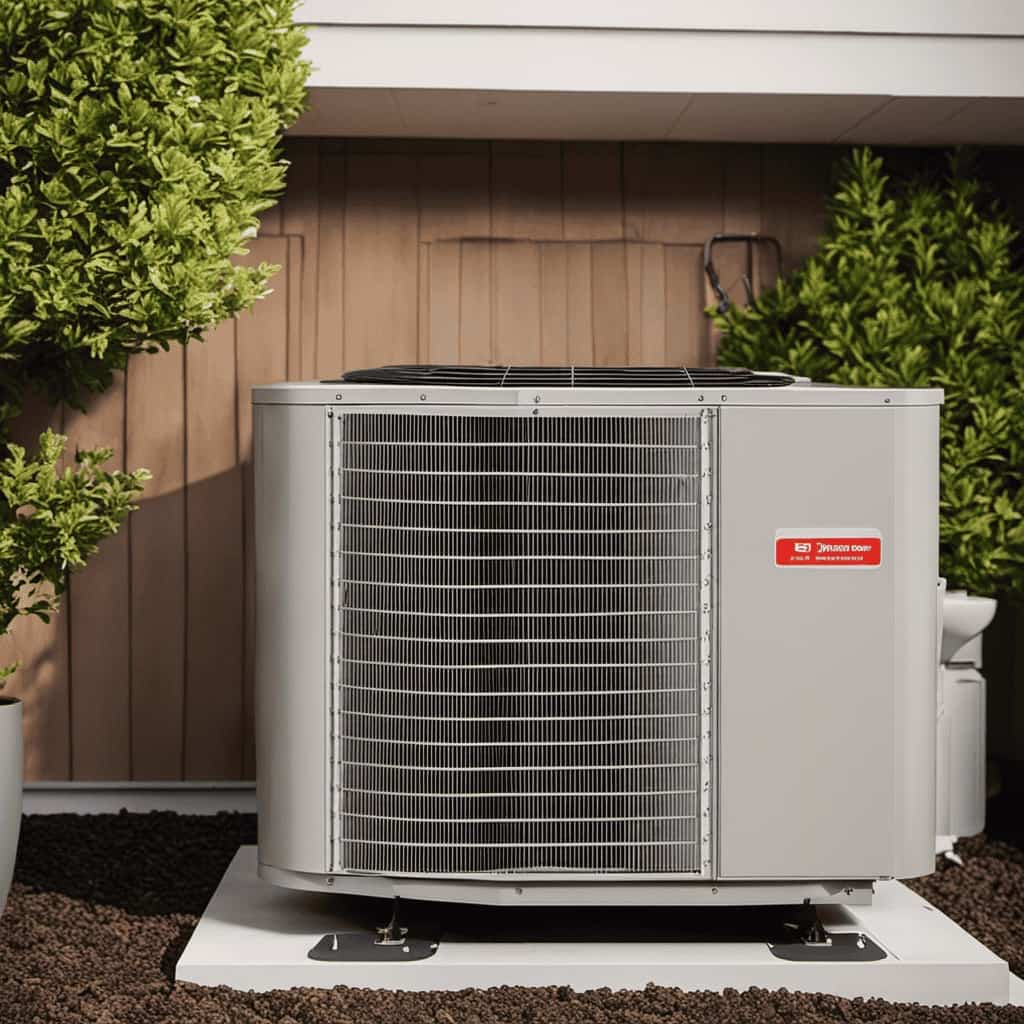
Now, let’s explore another strategy for achieving optimal climate control by incorporating zoning systems for targeted climate control.
Incorporating Zoning Systems for Targeted Climate Control
When it comes to achieving optimal climate control with heat pumps, incorporating zoning systems can offer several benefits.
Firstly, zoning allows for targeted climate control in different areas of a building, ensuring that each space receives the desired temperature and comfort level. This not only improves occupant comfort but also enhances energy efficiency by avoiding the unnecessary heating or cooling of unoccupied zones.
Benefits of Zoning
By incorporating zoning systems for targeted climate control, we can maximize the benefits of heat pumps and achieve optimal climate control in our homes.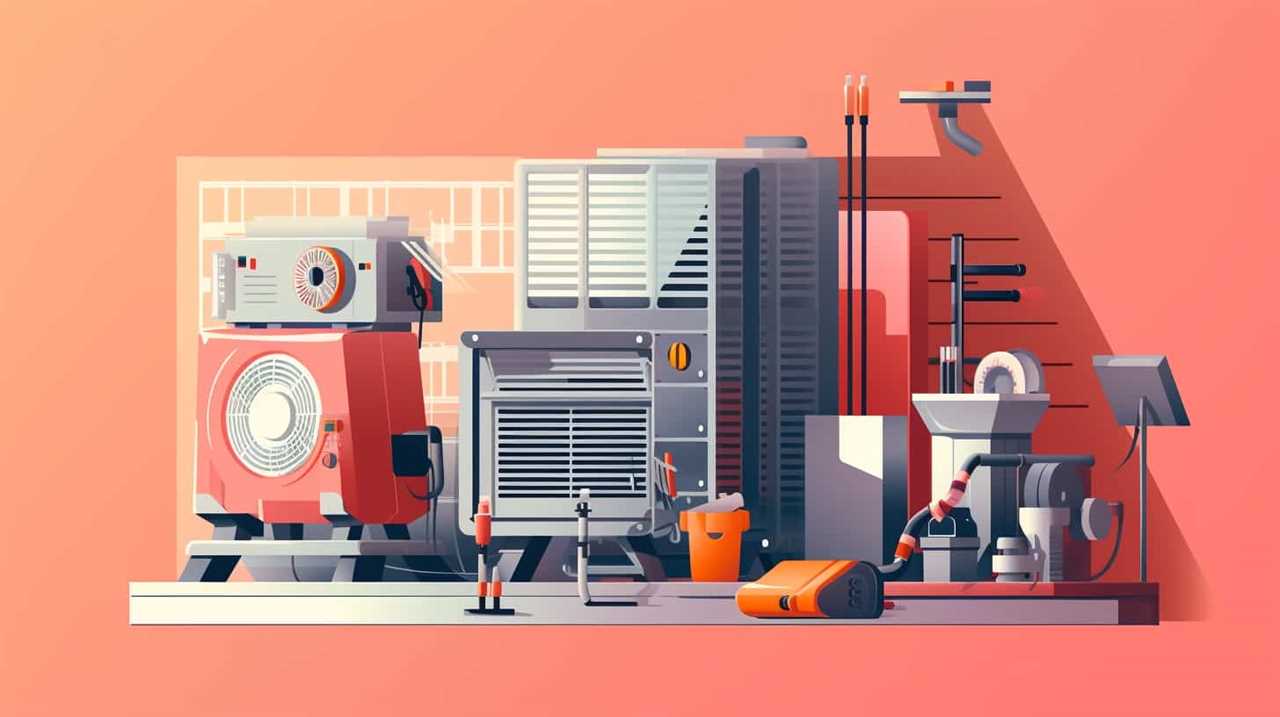
Zoning allows us to divide our homes into different areas and control the temperature independently in each zone. This provides several advantages:
Energy Efficiency: Zoning systems allow us to heat or cool only the areas that are occupied, reducing energy waste and saving money on utility bills. This increased energy efficiency also contributes to the reduction of carbon emissions, making our homes more environmentally friendly.
Personalized Comfort: With zoning, each family member can set their preferred temperature in their respective zones, ensuring individual comfort throughout the house.
Enhanced Control: Zoning systems provide us with precise control over the climate in different areas of our homes, allowing us to optimize comfort and energy usage.
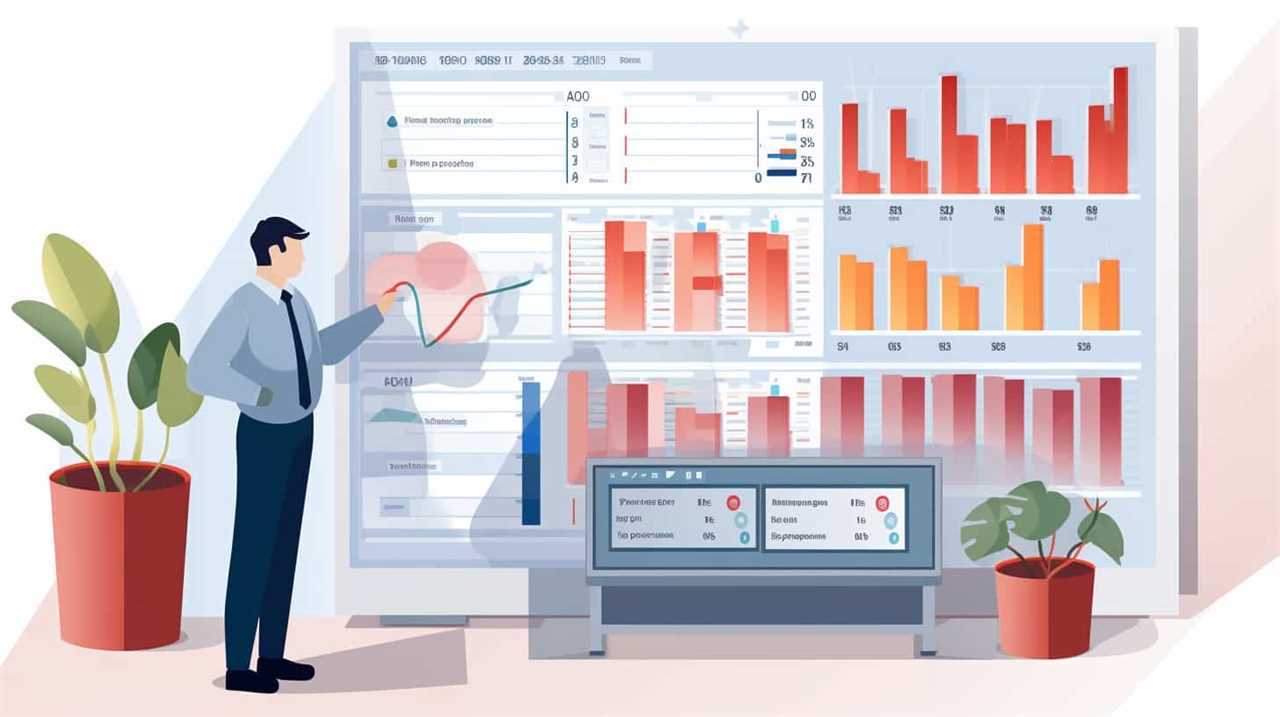
By incorporating zoning systems, we can’t only achieve optimal climate control but also enjoy the benefits of energy efficiency and reduced carbon emissions.
Now, let’s explore the energy efficiency advantages in more detail.
Energy Efficiency Advantages
One of the key advantages of incorporating zoning systems for targeted climate control is the increased energy efficiency they provide. By dividing a building into multiple zones, each with its own thermostat and independent control, energy saving strategies can be implemented more effectively. With zoning systems, it becomes possible to only heat or cool the areas that are occupied, rather than wasting energy on empty spaces. This targeted approach allows for significant energy savings, making zoning systems a cost effective solution for achieving optimal climate control.
By optimizing energy usage, businesses and homeowners can reduce their energy consumption and lower their utility bills. Zoning systems provide an efficient and sustainable way to manage indoor climate, offering both economic and environmental benefits.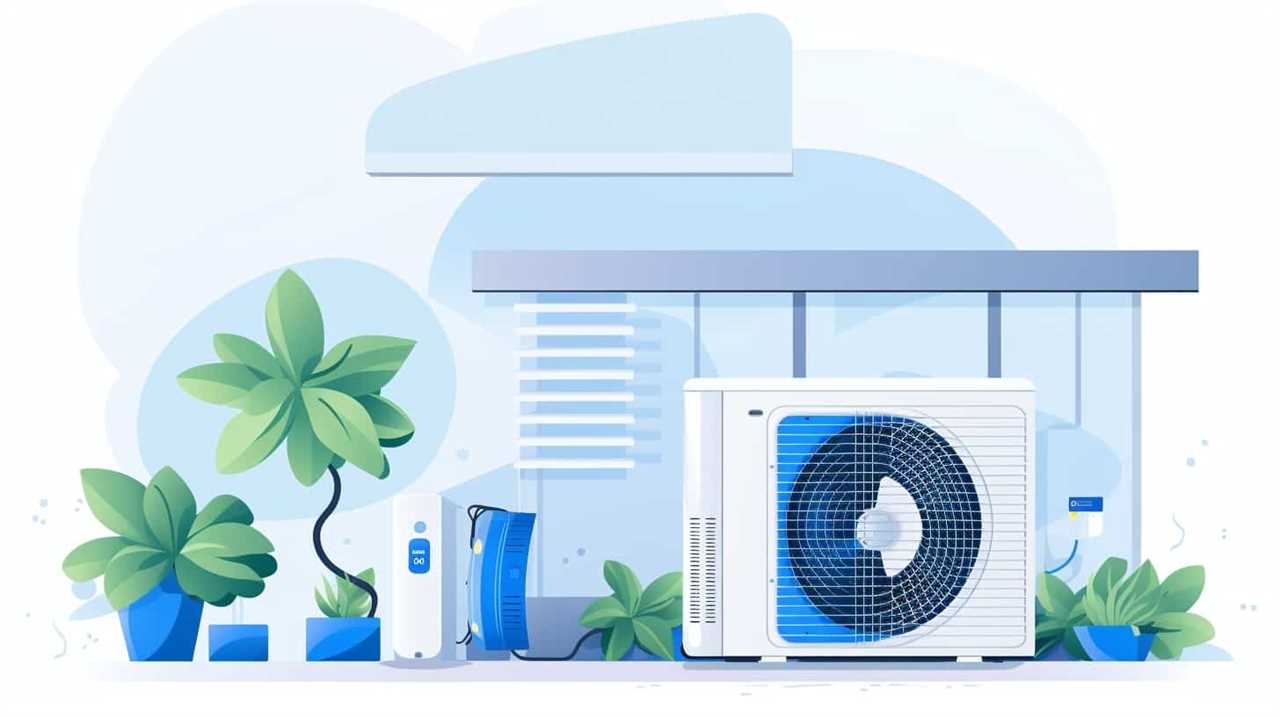
Transitioning into the next section, improved comfort levels can also be achieved through the use of zoning systems.
Improved Comfort Levels
To enhance our comfort levels, we can incorporate zoning systems for targeted climate control in our homes or businesses. Zoning systems allow for customized temperature settings in different areas, ensuring that each space is at the optimal temperature for comfort. This not only improves the overall comfort of the occupants but also enhances energy efficiency by reducing unnecessary heating or cooling in unoccupied areas.
Incorporating zoning systems offers several benefits, including:
Improved indoor air quality: With zoning, it’s easier to maintain a consistent and healthy indoor environment by controlling the airflow and ventilation in different zones. This helps to reduce the presence of pollutants and allergens, promoting better indoor air quality for everyone.

Reduced energy consumption: By only heating or cooling the necessary areas, zoning systems help to minimize energy wastage. This leads to lower energy bills and a more sustainable approach to climate control.
Enhanced individual comfort: Zoning allows occupants to personalize the climate settings in their own spaces, ensuring everyone’s specific comfort needs are met.
Utilizing Heat Pump Accessories for Enhanced Performance
We can enhance the performance of our heat pumps by utilizing a variety of accessories. Heat pump accessories play a crucial role in increasing the efficiency of the system, resulting in improved comfort levels and energy savings.
One such accessory is the programmable thermostat, which allows for precise temperature control and scheduling, optimizing the operation of the heat pump.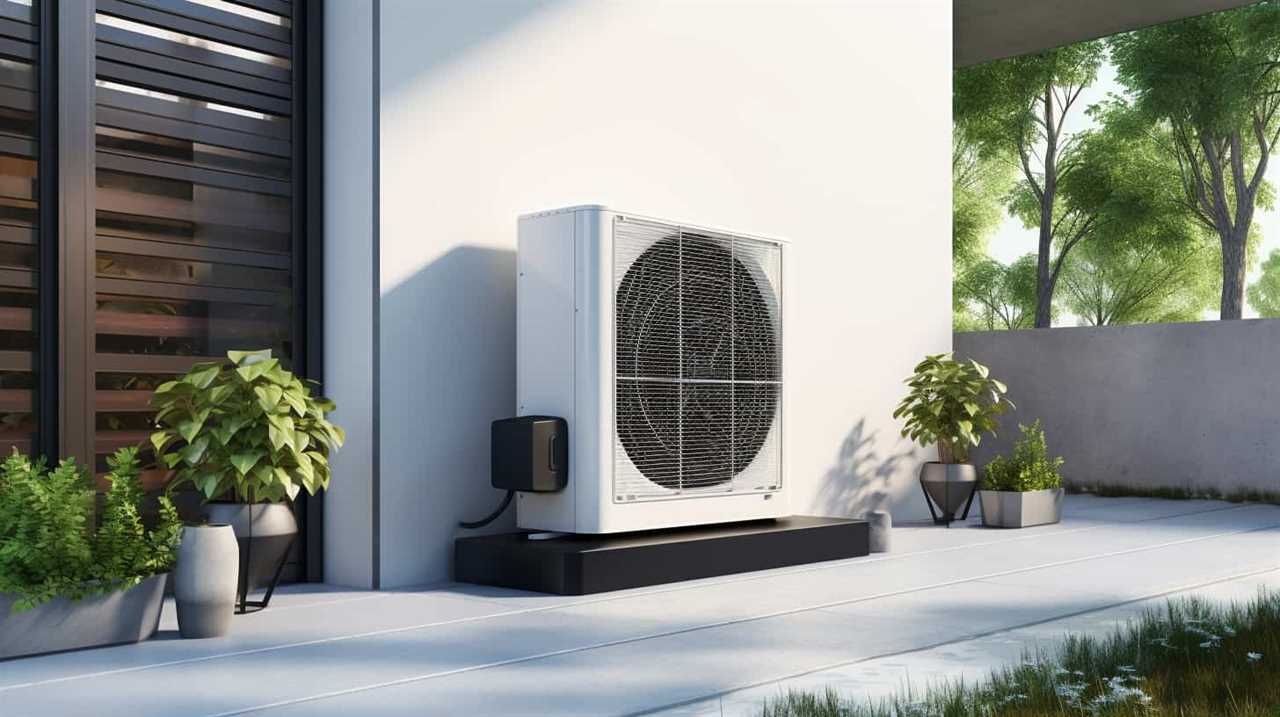
Another useful accessory is the filter dryer, which removes moisture and contaminants from the refrigerant, ensuring smooth and efficient heat transfer.
Additionally, using a condensate pump helps to efficiently remove condensate from the system, preventing any potential damage or blockages.
Managing Humidity Levels With Heat Pumps
Our goal is to effectively manage humidity levels with heat pumps to create a comfortable indoor environment. Proper humidity management is crucial for maintaining a healthy and pleasant living space. Here are three dehumidification techniques that can be used in conjunction with heat pumps:
Condensation: Heat pumps can remove excess moisture from the air by condensing it on a cold surface, such as an evaporator coil. This condensed water is then collected and drained away, resulting in reduced humidity levels.

Desiccant dehumidification: Heat pumps can also incorporate desiccants, such as silica gel, to absorb moisture from the air. The desiccant material is then regenerated by heating, releasing the collected moisture.
Variable-speed operation: Heat pumps equipped with variable-speed compressors can adjust their output based on the humidity levels in the room. This allows for precise control over the dehumidification process and ensures optimal comfort.
Addressing Common Heat Pump Issues and Troubleshooting
When it comes to heat pumps, it’s important to address common issues that may arise. By troubleshooting the heat pump, we can effectively resolve any problems and ensure optimal performance.
From identifying common heat pump problems to implementing the right solutions, addressing these issues is crucial for achieving optimal climate control.
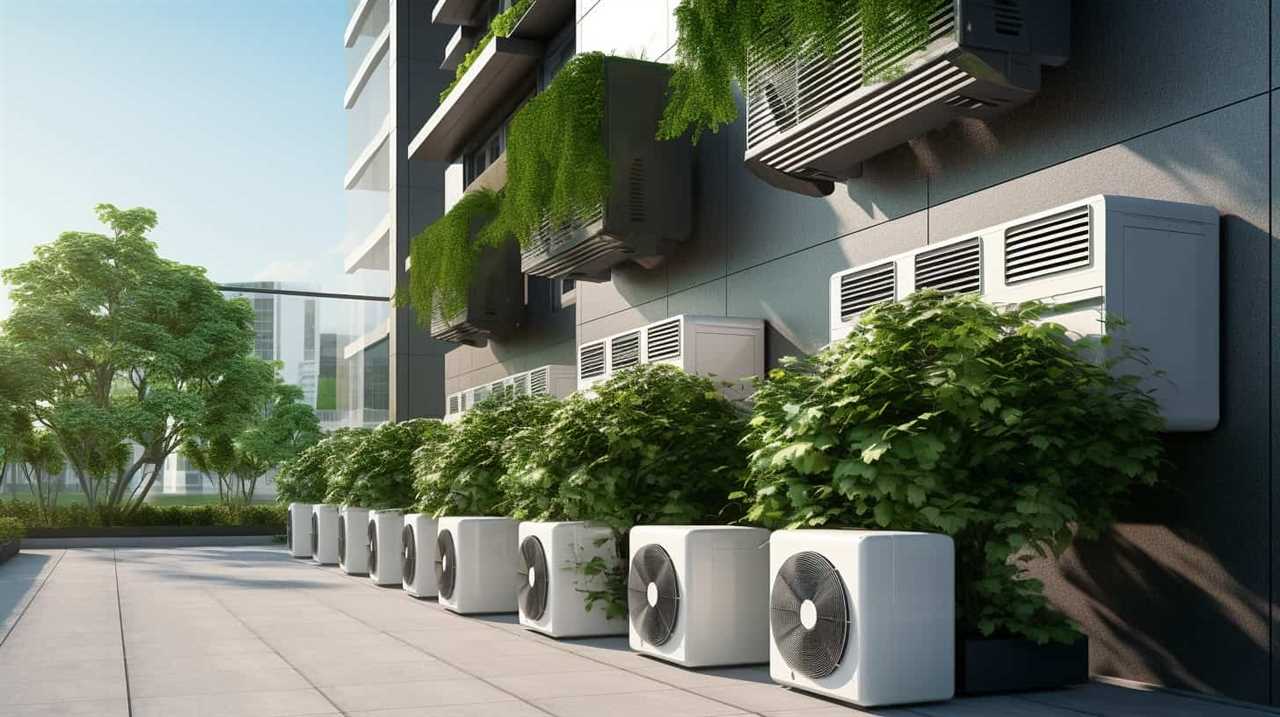
Common Heat Pump Problems
One common issue with heat pumps is a lack of sufficient airflow, which can lead to reduced heating or cooling performance. To address this problem, it’s important to regularly clean and replace air filters to ensure proper airflow.
Additionally, check for any obstructions or blockages in the ductwork that may be restricting airflow.
Another common problem is refrigerant leaks, which can cause the heat pump to operate inefficiently. To troubleshoot this issue, it’s recommended to schedule regular maintenance checks to detect and repair any leaks promptly.
Lastly, faulty thermostats can also affect the performance of a heat pump. Ensure that the thermostat is properly calibrated and functioning correctly to maintain optimal climate control.
Troubleshooting Heat Pump
We will address three common heat pump issues and provide troubleshooting tips to resolve them effectively. When troubleshooting a heat pump, it is important to start with the basics before contacting a professional. Here are some heat pump troubleshooting tips for three common issues:
No Heat/Cooling: Check the thermostat settings and ensure it is set to the desired temperature. Also, make sure the circuit breaker is not tripped and the power supply is on.
Insufficient Heat/Cooling: Clean or replace the air filters to ensure proper airflow. Check for any obstructions in the outdoor unit and remove them if necessary. Also, make sure the heat pump is not covered or obstructed by objects.
Strange Noises: Check for loose or damaged parts such as fan blades or motor mounts. Lubricate any moving parts if needed. If the noise persists, contact a professional for further inspection.
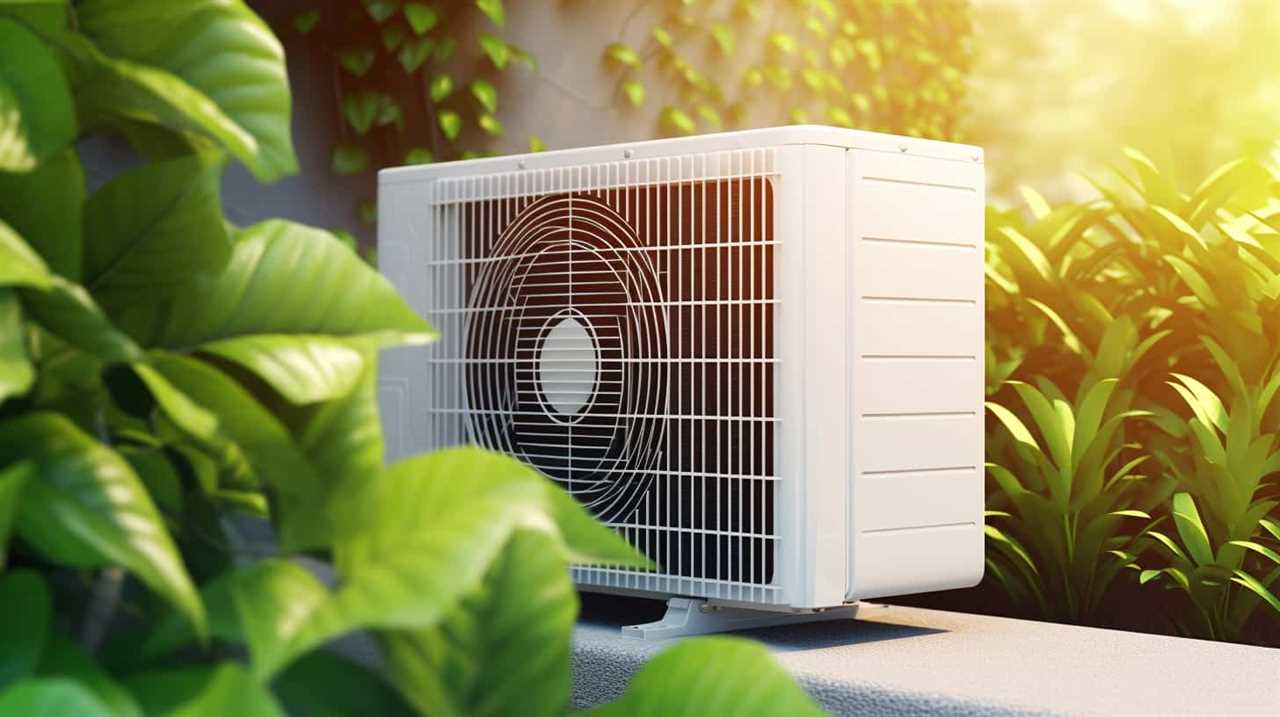
By following these heat pump troubleshooting tips, you can resolve common issues and ensure optimal performance of your heat pump system.
| Common Heat Pump Issues | Troubleshooting Tips |
|---|---|
| No Heat/Cooling | Check thermostat and power supply. |
| Insufficient Heat/Cooling | Clean or replace air filters. |
| Strange Noises | Check for loose or damaged parts. |
Effective Issue Resolution
Three common heat pump issues can be effectively resolved by following troubleshooting tips. Effective communication and conflict resolution are key in addressing these issues. Here are some tips to help resolve heat pump problems:
Insufficient heating or cooling: Check the thermostat settings and ensure they’re set correctly. Verify that the heat pump is receiving power and that the circuit breaker isn’t tripped. Clean or replace the air filter to ensure proper airflow.
Frozen evaporator coil: Check for restricted airflow caused by dirty air filters or blocked vents. If the issue persists, contact a professional to inspect the refrigerant levels and the condition of the coil.

Strange noises: Listen for unusual sounds such as grinding or rattling. These noises may indicate a loose or damaged component. Inspect the fan motor and blades, and tighten any loose connections.
Exploring Advanced Heat Pump Technologies for Optimal Climate Control
Advanced heat pump technologies offer significant improvements in achieving optimal climate control. When exploring renewable energy options, it’s crucial to consider the various heat pump options available.
The two main types of heat pumps commonly used are air-source heat pumps and ground-source heat pumps. Air-source heat pumps extract heat from the air and are more cost-effective, making them a popular choice for residential and commercial settings. Ground-source heat pumps, on the other hand, extract heat from the ground and offer higher efficiency, but they require a larger initial investment.
Both types of heat pumps provide efficient heating and cooling solutions, but the choice between them depends on factors such as budget, available space, and climate conditions.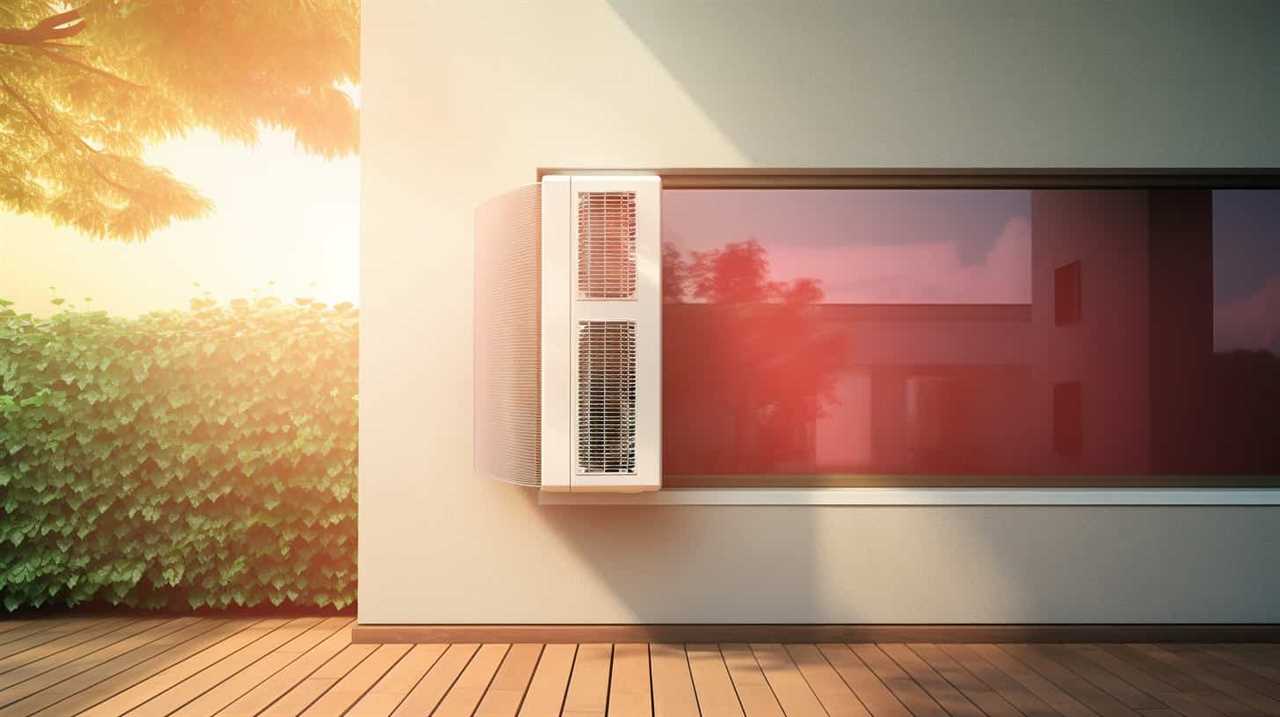
Frequently Asked Questions
How Do Heat Pumps Compare to Traditional Heating and Cooling Systems in Terms of Energy Efficiency?
Heat pumps, compared to traditional HVAC systems, offer higher energy efficiency. They transfer heat rather than generate it, resulting in reduced energy consumption and cost savings. This makes them an optimal choice for achieving an optimal climate.
Are There Any Government Incentives or Rebates Available for Installing a Heat Pump?
Are there any government incentives or rebates available for installing a heat pump? Yes, there are. These incentives aim to promote energy savings and encourage the use of more efficient heating and cooling systems.
Can a Heat Pump Be Used in Colder Climates With Low Temperatures?
Yes, a heat pump can be used in colder climates with low temperatures. However, it’s important to consider heat pump efficiency and installation costs when determining the best strategy for achieving optimal climate.
What Is the Average Lifespan of a Heat Pump and When Should It Be Replaced?
The average lifespan of a heat pump is around 15 years. It should be replaced when it starts experiencing frequent breakdowns or when its efficiency drops significantly, usually after 10-15 years of use.
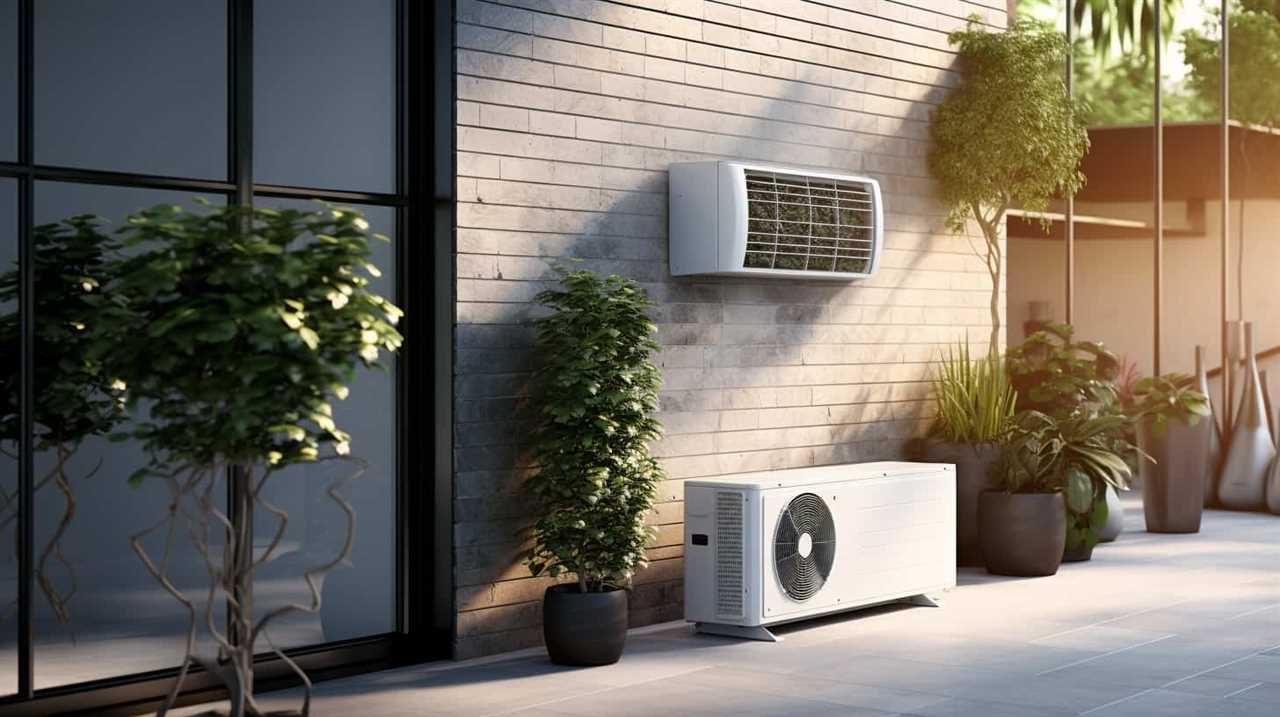
Can a Heat Pump Be Used to Heat Water for Domestic Use?
Yes, heat pump water heaters can be used to heat water for domestic use. The benefits of using a heat pump for water heating include energy efficiency, cost savings, and reduced greenhouse gas emissions.
What Are Some of the Best Heat Pump Strategies for Achieving Optimal Climate Control?
When it comes to achieving optimal climate control, implementing effective heat pump strategies is crucial. By utilizing the top heat pumps for climate control, you can maintain a comfortable temperature throughout the year. Whether it’s adjusting the thermostat settings or ensuring proper insulation, these strategies ensure an efficient and environmentally friendly way to keep your indoor climate just right.
Conclusion
In conclusion, by following these strategies, we can achieve the optimal climate control with heat pumps.
Understanding the technology, choosing the right size, proper installation and maintenance, optimizing airflow and ventilation, and utilizing accessories are crucial for efficient performance.
Managing humidity levels and addressing common issues are also important.
Exploring advanced heat pump technologies can further enhance climate control.
Remember, ‘prevention is better than cure’ – investing in these strategies will ensure a comfortable and energy-efficient environment for all.
Climate Control
8 Cutting-Edge High-Efficiency Heat Pumps for All Climates You Must Know About
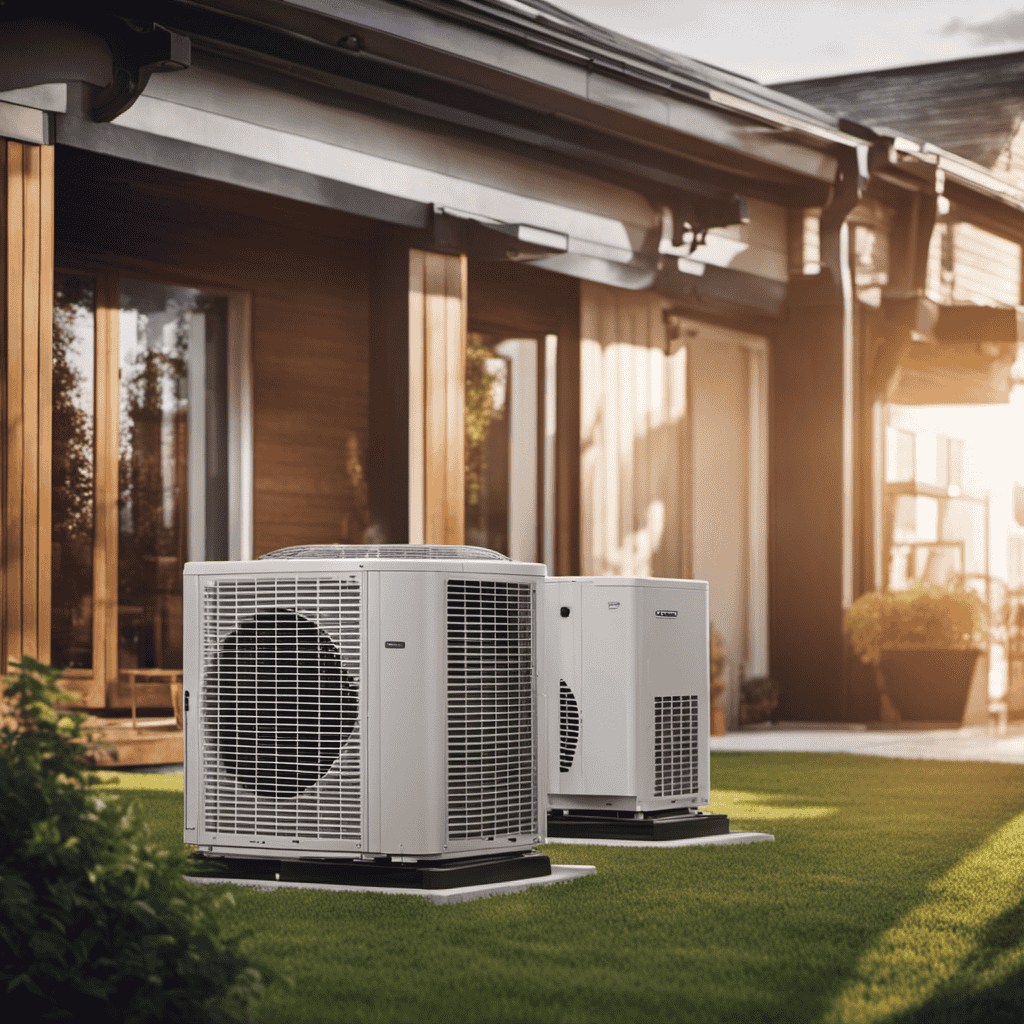
Are you fed up with cold winters and hot summers? Don’t worry, we have information on the newest and best heat pumps that will change the way you control your indoor climate.
From the super-efficient Heat Pump X to the all-weather wonder of Heat Pump Z, these cutting-edge machines will keep you comfortable in any climate. Say goodbye to sky-high energy bills and hello to the future of heating.
Get ready to be blown away by the power of heat pumps!
Key Takeaways
- Heat Pump X, Heat Pump Y, Heat Pump Z, Heat Pump A, and Heat Pump B offer high efficiency and sustainability.
- Assessing specific climate conditions is essential for determining optimal temperature settings for heat pumps.
- Heat Pump Y incorporates energy-saving technology and efficient operation to minimize energy consumption.
- Heat Pump B offers a cost-effective and environmentally friendly solution with significant energy savings and lower carbon emissions.
The Future of Heating: Introducing Heat Pump X
We can’t wait to tell you about the future of heating with our groundbreaking heat pump X. The advancements in heating technology have revolutionized the way we keep our homes warm and comfortable. Heat Pump X is a game-changer in the industry, offering unparalleled efficiency and sustainability.
This cutting-edge heat pump utilizes state-of-the-art technology to extract heat from the air or ground, transferring it into your home. It operates on a refrigeration cycle, absorbing heat from the outside environment and delivering it indoors. This process is highly energy-efficient, providing significant cost savings compared to traditional heating systems.
Heat Pump X is designed to work effectively in all climates, from frigid winters to scorching summers. It can efficiently heat your home during the colder months and cool it during the hotter months, offering year-round comfort. Its advanced controls allow for precise temperature adjustments, ensuring optimal comfort levels for you and your family.
Not only does Heat Pump X provide exceptional heating and cooling capabilities, but it’s also environmentally friendly. By utilizing renewable energy sources, it reduces greenhouse gas emissions and helps combat climate change. This makes it a perfect choice for individuals who desire to serve others by reducing their carbon footprint.
Unleashing Efficiency: The Power of Heat Pump Y
Heat Pump Y is a game-changer in terms of efficiency, offering optimal temperature control in all climates. Its energy-saving technology ensures efficient operation, reducing energy consumption and saving costs.
Not only is Heat Pump Y suitable for residential applications, but it also has versatile applications in commercial settings. This versatility makes it a highly adaptable and powerful heating solution.
Climate Compatibility: Optimal Temperatures
Achieving optimal temperatures is crucial for unleashing the efficiency of Heat Pump Y in different climates. By carefully selecting the optimal temperature settings, we can ensure that the heat pump operates at its highest efficiency, providing maximum comfort while minimizing energy consumption.
Here are three key considerations for determining the optimal temperature settings:
-
Climate impact assessment: It’s essential to assess the specific climate conditions of the location where the heat pump will be installed. Factors such as average temperatures, humidity levels, and seasonal variations play a significant role in determining the optimal temperature range.
-
Heat pump capacity: The size and capacity of the heat pump should align with the heating and cooling needs of the space. Oversized or undersized heat pumps can lead to inefficient operation and unnecessary energy consumption.
-
User preferences: Understanding the preferences and comfort requirements of the occupants is vital for setting the optimal temperature range. By considering factors such as desired indoor temperature, humidity levels, and personal preferences, the heat pump can be tailored to meet individual needs effectively.
Energy-Saving Technology: Efficient Operation
With the power of Heat Pump Y, we can maximize efficiency through its energy-saving technology and ensure its efficient operation in all climates.
Heat Pump Y incorporates an efficient design that allows for optimal energy conservation. Its advanced features and components work together to minimize energy consumption, resulting in significant cost savings for users.
The heat pump utilizes cutting-edge technology to extract heat from the air or ground and transfer it indoors for heating purposes. This process is carried out with minimal energy loss, ensuring maximum efficiency.
Heat Pump Y also employs smart control systems that continuously monitor and adjust performance to optimize energy usage. By prioritizing energy efficiency, Heat Pump Y provides a sustainable and environmentally friendly solution for heating and cooling needs.
Now, let’s explore the versatile applications of this high-efficiency heat pump in both residential and commercial settings.
Versatile Applications: Residential and Commercial
How can we utilize the power of Heat Pump Y in both residential and commercial settings to achieve maximum efficiency? Heat Pump Y offers versatile applications that make it suitable for both residential and commercial installations. Here are three ways in which Heat Pump Y can enhance residential and commercial efficiency:
-
Residential Installation: Heat Pump Y can be installed in homes to provide efficient heating and cooling solutions. Its high-efficiency performance ensures reduced energy consumption and lower utility bills for homeowners. Additionally, Heat Pump Y’s advanced technology allows for convenient temperature control and improved indoor air quality, creating a comfortable living environment.
-
Commercial Efficiency: In commercial settings such as offices, retail spaces, and hotels, Heat Pump Y can significantly improve energy efficiency. By using the heat pump’s heating and cooling capabilities, commercial buildings can reduce their reliance on traditional HVAC systems, leading to decreased energy usage and cost savings. Moreover, Heat Pump Y’s ability to provide consistent temperature regulation and precise climate control is beneficial for businesses that require optimal comfort for employees and customers.
-
Environmental Benefits: By utilizing Heat Pump Y in both residential and commercial settings, we can contribute to the reduction of greenhouse gas emissions. Heat pumps are known for their eco-friendly operation, as they extract heat from the air or ground instead of burning fossil fuels. This sustainable heating and cooling solution aligns with the goals of environmental conservation and promotes a greener future for our communities.
All-Weather Performance: Meet Heat Pump Z
We have found that Heat Pump Z offers exceptional all-weather performance in various climates. Its advanced technology optimizes performance, making it a reliable choice for achieving year-round comfort. Heat Pump Z is designed to operate efficiently in both hot and cold weather conditions, ensuring that you can enjoy a comfortable indoor environment regardless of the external temperature.
One of the key advancements of Heat Pump Z is its ability to adjust its performance based on the specific climate it’s operating in. This allows it to maximize efficiency and minimize energy consumption, ultimately saving you money on heating and cooling costs. Whether you live in a region with extreme heat or freezing temperatures, Heat Pump Z can adapt to provide optimal comfort without compromising on performance.
Furthermore, Heat Pump Z incorporates innovative features that enhance its all-weather capabilities. It has a defrost cycle that prevents ice buildup on the outdoor unit during cold weather, ensuring uninterrupted operation even in freezing conditions. Additionally, it utilizes a multi-stage compressor that adjusts its output based on the heating or cooling demands, resulting in precise temperature control and improved energy efficiency.
Revolutionary Technology: Exploring Heat Pump A
Let’s delve into the revolutionary technology behind Heat Pump A, which utilizes cutting-edge features to enhance its performance in various climates. This groundbreaking heat pump is designed to provide efficient and reliable heating and cooling, making it an ideal choice for residential and commercial applications.
Here are three key features that make Heat Pump A stand out:
-
Advanced Variable Speed Compressor: Heat Pump A incorporates an advanced variable speed compressor, which allows for precise control of heating and cooling output. This technology ensures that the heat pump operates at optimal efficiency, adjusting its speed to match the heating or cooling demand. This not only maximizes comfort but also saves energy and reduces utility costs.
-
Intelligent Defrosting System: Heat Pump A is equipped with an intelligent defrosting system that prevents ice buildup on the outdoor unit during cold weather. By automatically monitoring and adjusting defrost cycles, this system ensures efficient operation even in extremely low temperatures. This feature minimizes downtime and reduces the need for manual intervention, making Heat Pump A a reliable choice for all climates.
-
Enhanced Heat Exchange Technology: Heat Pump A utilizes enhanced heat exchange technology, which improves its heat transfer efficiency. This technology allows the heat pump to extract heat from the air or ground more effectively, resulting in higher heating capacities and improved overall performance.
Whether it’s exploring Heat Pump F or Heat Pump G, Heat Pump A is designed to provide exceptional heating and cooling performance in any climate.
Transitioning to the subsequent section, let’s now discover sustainable solutions with Heat Pump B, which offers innovative features for energy-efficient and environmentally friendly heating and cooling.
Sustainable Solutions: Discover Heat Pump B
Let’s talk about the cost-effectiveness and environmental benefits of Heat Pump B.
This cutting-edge technology offers a highly efficient solution for heating and cooling in all climates. With its advanced design and smart features, Heat Pump B can significantly reduce energy consumption and lower utility bills.
Moreover, it utilizes environmentally friendly refrigerants, minimizing its carbon footprint and contributing to a greener future.
Cost-effectiveness of Heat Pump B
The cost-effectiveness of Heat Pump B makes it a sustainable solution for all climates. Here are three reasons why:
-
Energy Saving Capabilities: Heat Pump B is designed with advanced technology that maximizes energy efficiency. It utilizes a two-stage compressor and variable-speed fan motor, allowing it to operate at different speeds depending on the heating or cooling demand. This results in significant energy savings compared to traditional heating and cooling systems.
-
Lower Operating Costs: Due to its high efficiency, Heat Pump B consumes less energy, which translates into lower monthly utility bills. Additionally, its smart thermostat feature enables users to program temperature settings, optimizing energy usage and further reducing costs.
-
Long-Term Savings: Although Heat Pump B may have a higher upfront cost compared to conventional systems, its energy-saving capabilities result in long-term savings. The reduced energy consumption and lower operating costs make Heat Pump B a cost-effective investment that pays off over time.
Environmental Benefits of Heat Pump B
We can’t ignore the positive impact that Heat Pump B has on the environment with its efficient energy usage and reduced carbon emissions. This heat pump not only provides effective heating and cooling solutions, but also contributes to a greener and more sustainable future. Let’s take a closer look at the environmental benefits of Heat Pump B.
| Environmental Benefits | Details |
|---|---|
| Reduced Energy Consumption | Heat Pump B is designed to operate with high efficiency, resulting in lower energy consumption compared to traditional heating and cooling systems. This not only reduces utility bills, but also decreases the overall demand for energy, leading to a reduced environmental impact. |
| Lower Carbon Emissions | By utilizing renewable energy sources, such as electricity, Heat Pump B significantly reduces carbon emissions. This helps combat climate change and improves air quality, making it a more eco-friendly choice. |
| Minimal Use of Fossil Fuels | Heat Pump B relies on electricity rather than fossil fuels, further reducing the dependency on non-renewable resources and decreasing the environmental footprint. |
| Reduced Noise Pollution | Heat Pump B operates quietly, minimizing noise pollution in residential and commercial areas. This improves the overall quality of life and contributes to a more peaceful environment. |
| Long Lifespan | Heat Pump B is built to last, resulting in less waste and environmental impact compared to systems that require frequent replacement. Its durability ensures a sustainable solution for many years to come. |
With its efficient energy usage, reduced carbon emissions, and other environmental benefits, Heat Pump B is a sustainable solution that not only serves our heating and cooling needs but also helps protect our planet for future generations.
Climate-Adaptive Innovation: Introducing Heat Pump C
While heat pumps A and B have already made significant advancements in climate-adaptive innovation, it’s time to introduce heat pump C as the latest cutting-edge solution for all climates.
Here are three reasons why heat pump C stands out as a climate-adaptive innovation:
-
Enhanced Efficiency: Heat pump C utilizes advanced technology to maximize energy efficiency, resulting in significant energy savings. Its intelligent control system adjusts the heating and cooling output based on the specific climate conditions, ensuring optimal performance in any environment. By reducing energy consumption, heat pump C contributes to climate change adaptation by minimizing greenhouse gas emissions.
-
Wide Temperature Range: Unlike traditional heat pumps that struggle in extreme climates, heat pump C is designed to operate efficiently in a wide temperature range. Whether it’s scorching heat or freezing cold, heat pump C maintains exceptional performance, providing consistent comfort throughout the year. This adaptability ensures that households and businesses can rely on heat pump C as a reliable heating and cooling solution, regardless of their location.
-
Smart Integration: Heat pump C incorporates smart technology and can be seamlessly integrated into existing home automation systems. This allows users to control and monitor their heating and cooling settings remotely, optimizing energy usage and ensuring a comfortable indoor environment. By embracing this level of connectivity, heat pump C enhances convenience and empowers individuals to make sustainable choices.
Heat pump C represents a significant step forward in climate-adaptive innovation. Its energy-efficient solutions, adaptability to various climates, and smart integration capabilities make it an excellent choice for individuals and businesses looking to reduce their environmental impact while enjoying optimal comfort.
Cutting-Edge Efficiency: Unveiling Heat Pump D
With its groundbreaking technology and exceptional performance, heat pump D sets a new standard for cutting-edge efficiency in all climates. This advanced heat pump is designed to maximize efficiency in buildings, providing both heating and cooling capabilities while minimizing energy consumption.
One of the most impressive features of heat pump D is its ability to adapt to various climate conditions. Whether it’s a scorching summer or a freezing winter, this heat pump can maintain optimal performance, ensuring comfort and energy savings all year round.
To better understand the advanced features of heat pump D, let’s take a look at the table below:
| Features | Description | Benefits |
|---|---|---|
| Intelligent Control | Automatically adjusts settings based on weather data | Optimizes energy consumption and reduces costs |
| Variable Speed Compressor | Adjusts compressor speed according to load requirements | Increases efficiency and reduces wear and tear |
| Dual Fuel Capability | Can automatically switch between gas and electric heating | Provides flexibility and cost savings |
| Smart Defrost System | Prevents ice buildup and ensures efficient operation | Improves performance and reduces maintenance needs |
| Energy Monitoring | Provides real-time energy usage information | Helps users track and optimize energy consumption |
With these advanced features, heat pump D not only delivers exceptional efficiency but also allows users to take control of their energy usage. By maximizing efficiency in buildings, this heat pump contributes to a more sustainable and comfortable future.
Next-Level Heating: Get to Know Heat Pump E
Heat Pump E offers advanced heating capabilities that are unmatched in the industry. With its next-gen heat pump technology, it brings numerous benefits to both residential and commercial settings. Here are three key reasons why Heat Pump E is a game-changer:
-
Superior Efficiency: Heat Pump E utilizes cutting-edge technology to deliver exceptional heating performance. Its innovative design maximizes energy efficiency, allowing for significant cost savings on heating bills. With its high coefficient of performance (COP), Heat Pump E can provide more heat output for every unit of electricity consumed, making it an environmentally friendly choice.
-
Wide Temperature Range: Unlike traditional heat pumps that struggle in extreme cold climates, Heat Pump E excels in all weather conditions. It can maintain its heating capacity even in sub-zero temperatures, ensuring a comfortable indoor environment year-round. Whether you live in a cold northern region or a mild southern climate, Heat Pump E will keep you warm efficiently.
-
Smart and Convenient Features: Heat Pump E is equipped with smart technology that enhances user experience. It offers intuitive controls and programmable settings, allowing users to easily customize their heating preferences. Additionally, Heat Pump E can be integrated with home automation systems, enabling remote control and energy management. Its advanced diagnostic capabilities also ensure quick and accurate troubleshooting, minimizing downtime.
With its next-gen technology and an array of benefits, Heat Pump E is a top choice for those seeking efficient, reliable, and convenient heating solutions.
Frequently Asked Questions
How Much Does Heat Pump X Cost?
When considering the cost of heat pump X, it’s important to take into account the benefits it offers in terms of energy savings.
Our team has conducted a cost comparison analysis and found that heat pump X provides significant energy savings compared to other models on the market.
While the exact cost of heat pump X may vary depending on factors such as installation and location, the long-term energy savings make it a worthwhile investment.
Are There Any Government Incentives or Rebates Available for Purchasing Heat Pump Y?
Yes, there are government incentives and rebates available for purchasing heat pump y. These incentives are designed to promote energy savings and encourage individuals to adopt more efficient heating technologies.
By taking advantage of these incentives, homeowners can reduce the upfront cost of purchasing a high-efficiency heat pump and enjoy long-term energy savings.
These government programs provide a valuable opportunity for individuals to contribute to a greener and more sustainable future.
What Is the Warranty Period for Heat Pump Z?
The warranty coverage for heat pump z is an important consideration when purchasing a high-efficiency heat pump.
It’s crucial to understand the length of the warranty period and what it covers.
Additionally, it’s essential to be aware of the maintenance requirements to ensure the warranty remains valid.
Can Heat Pump a Be Used as a Standalone Heating System or Does It Require Additional Equipment?
Heat pump A can indeed be used as a standalone heating system without the need for additional equipment. Its cutting-edge technology allows it to efficiently heat your space regardless of the climate.
This high-efficiency heat pump is designed to provide optimal comfort and savings without the hassle of complicated installations or supplementary devices. With heat pump A, you can enjoy a reliable and effective heating solution that meets your needs without any added complications.
Is Heat Pump B Compatible With Smart Home Systems for Remote Control and Monitoring?
Yes, heat pump b is compatible with smart home systems for remote control and monitoring.
The integration of heat pump b with home automation allows for seamless control and monitoring of the system from anywhere.
This offers numerous benefits, such as the ability to adjust temperature settings remotely, optimize energy usage, and receive real-time alerts and notifications.
With heat pump b remote control, users can enjoy enhanced convenience, comfort, and energy efficiency in their homes.
Can These High-Efficiency Heat Pumps Help Test the Energy Efficiency of My Current Heat Pumps?
Can these high-efficiency heat pumps help test the energy efficiency of my current heat pumps? If you’re looking to optimize your heating system, considering heat pump energy efficiency tips is essential. High-efficiency heat pumps can provide a benchmark to evaluate your current system’s efficiency. By assessing their performance and comparing it to your current setup, you can identify potential upgrades or improvements for better energy efficiency.
Conclusion
In the ever-evolving world of heating technology, these cutting-edge high-efficiency heat pumps have emerged as game-changers.
From the revolutionary Heat Pump A to the climate-adaptive Heat Pump C, these innovative solutions are reshaping the way we heat our homes.
With their all-weather performance and sustainable features, such as the eco-friendly Heat Pump B, these pumps are paving the way towards a greener and more efficient future.
Embrace the next-level heating experience with Heat Pump E and unlock the power of comfort and energy savings.
Climate Control
Unveiling the Efficiency Secrets of HVAC Heat Pumps

Prepare to discover the hidden treasures of HVAC heat pumps! In this article, we, your reliable experts, will unveil the efficiency tips that will transform your heating and cooling system.
By exploring the crucial role of proper insulation, optimizing airflow, selecting the right size, and maintaining your heat pump, we will empower you with the knowledge to achieve maximum efficiency.
Get ready to liberate your HVAC system and embrace a new era of comfort and cost savings.
Key Takeaways
- Proper insulation and weatherization are essential for maximizing HVAC heat pump efficiency.
- Regular maintenance, including filter cleaning and coil inspection, ensures optimal performance and longevity.
- Correctly sized and designed ductwork is crucial for balanced airflow and efficient operation.
- Advanced technologies such as smart controls and variable speed compressors can enhance heat pump efficiency and performance.
The Role of Proper Insulation in HVAC Heat Pump Efficiency
Why is proper insulation important for maximizing the efficiency of our HVAC heat pumps?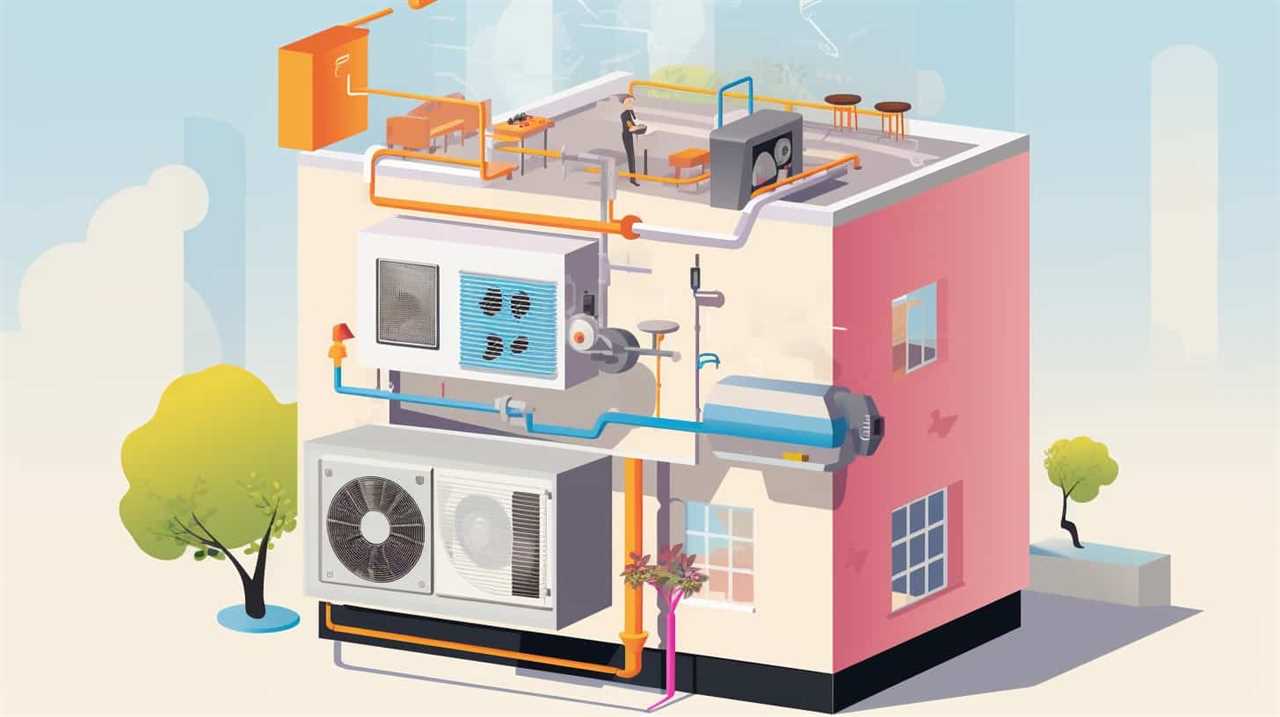
The role of weatherization in HVAC heat pump efficiency can’t be overstated. Proper insulation plays a crucial role in maintaining the desired indoor temperature while minimizing energy loss. Without adequate insulation, heat pumps must work harder to compensate for the escaped heat or cool air, resulting in reduced efficiency and increased energy consumption.
Additionally, the impact of ductwork on heat pump performance shouldn’t be overlooked. Leaky or poorly insulated ducts can lead to significant energy losses, compromising the overall efficiency of the system.
Optimizing Airflow for Enhanced HVAC Heat Pump Performance
To maximize the performance of our HVAC heat pumps, we need to optimize airflow for enhanced efficiency. Proper airflow management is crucial in achieving optimal heat pump operation and energy utilization. Here are three key strategies for heat pump optimization through airflow management:
Duct design and sizing: Ensure that the ductwork is correctly sized and designed to deliver the required airflow to each room. Improperly sized ducts can lead to air pressure imbalances and reduced system performance.
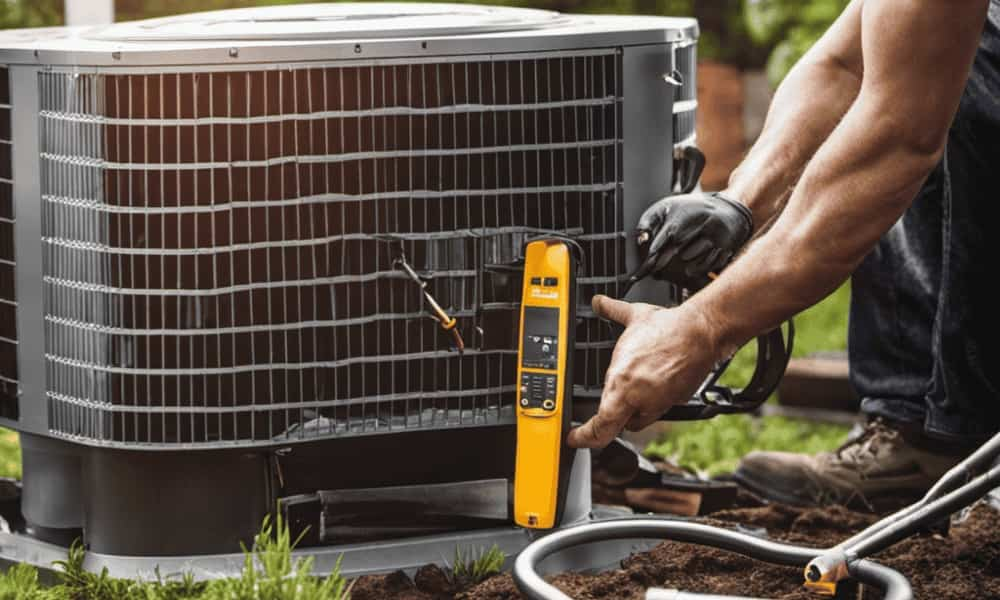
Regular filter maintenance: Clean or replace air filters regularly to prevent clogging and airflow restrictions. Restricted airflow can strain the heat pump, leading to decreased efficiency and increased energy consumption.
Airflow balancing: Balance the supply and return airflow throughout the system to maintain proper air distribution. Uneven airflow can result in hot or cold spots, reducing comfort and wasting energy.
Selecting the Right Size Heat Pump for Maximum Efficiency
We need to ensure that we select the right size heat pump for maximum efficiency. Sizing considerations play a crucial role in determining the energy consumption and overall performance of a heat pump.
Oversized heat pumps may lead to short cycling, where the unit turns on and off frequently, resulting in higher energy consumption and reduced efficiency.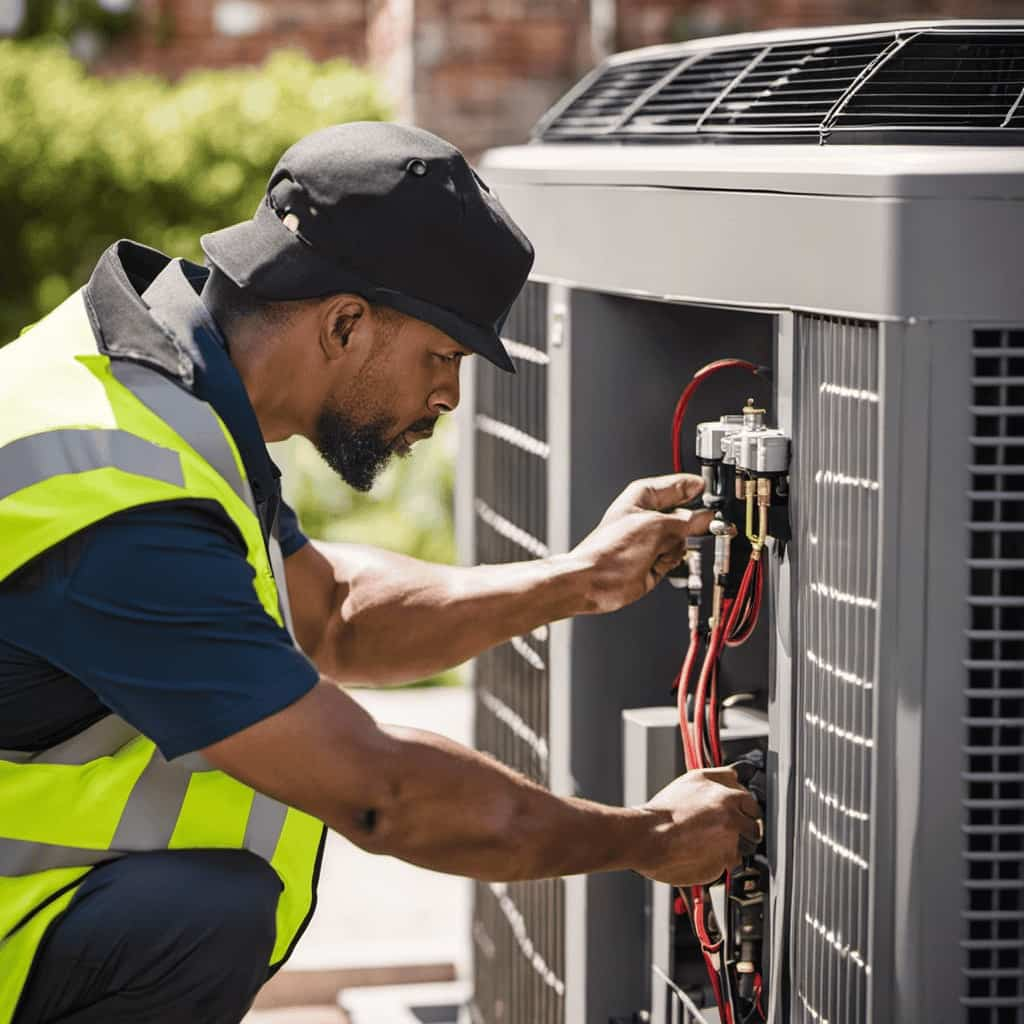
On the other hand, undersized heat pumps may struggle to meet the heating or cooling demands of the space, leading to increased energy usage and discomfort.
To select the right size heat pump, it’s important to consider factors such as the size and insulation of the space, climate conditions, and the heat pump’s heating and cooling capacity.
Conducting a thorough load calculation is essential to accurately determine the appropriate size of the heat pump for optimal efficiency.
The Importance of Regular HVAC Heat Pump Maintenance
Regular HVAC heat pump maintenance is essential for optimal performance and longevity. To ensure your heat pump operates at its best, it’s important to follow a regular maintenance checklist:
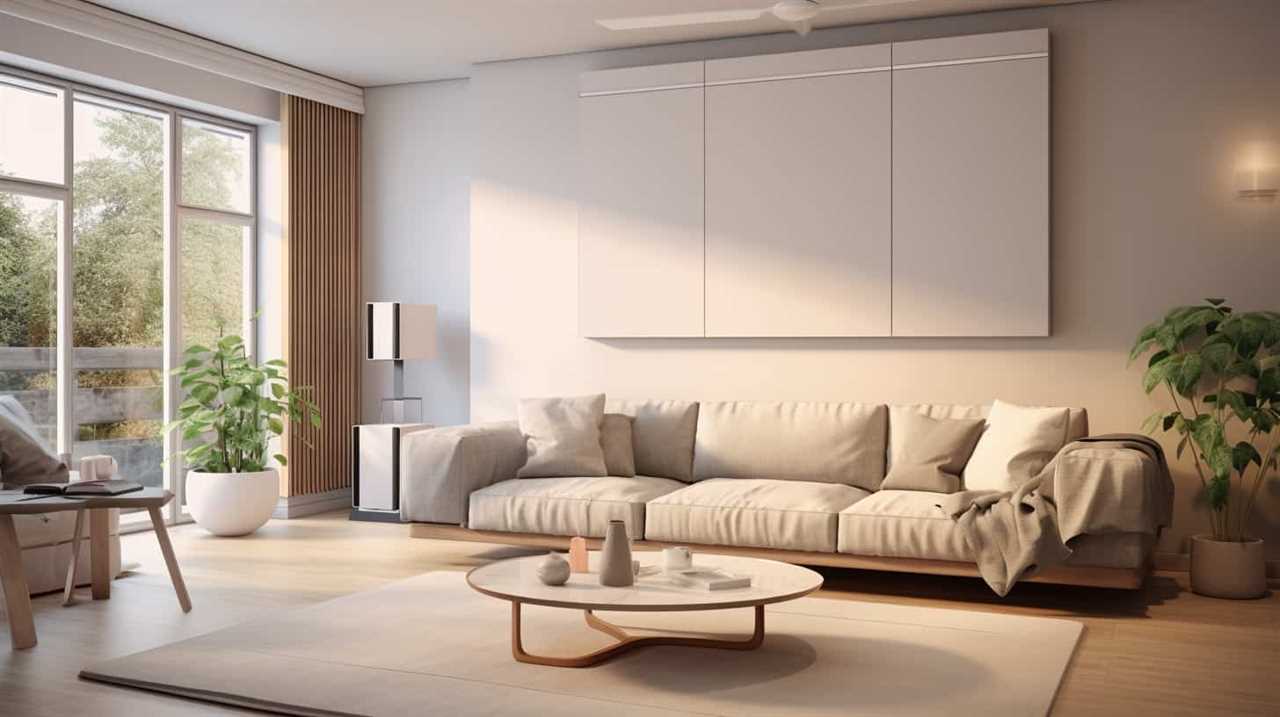
Cleaning the Filters: Dirty filters can restrict airflow and reduce efficiency. Regularly clean or replace filters to maintain optimal airflow.
Inspecting and Cleaning the Coils: Over time, coils can accumulate dirt and debris, hindering heat transfer. Regularly inspect and clean the coils to improve efficiency.
Checking Refrigerant Levels: Proper refrigerant levels are crucial for the heat pump’s performance. Regularly check and adjust refrigerant levels as needed.
By following these maintenance tasks, you can keep your heat pump operating efficiently and extend its lifespan.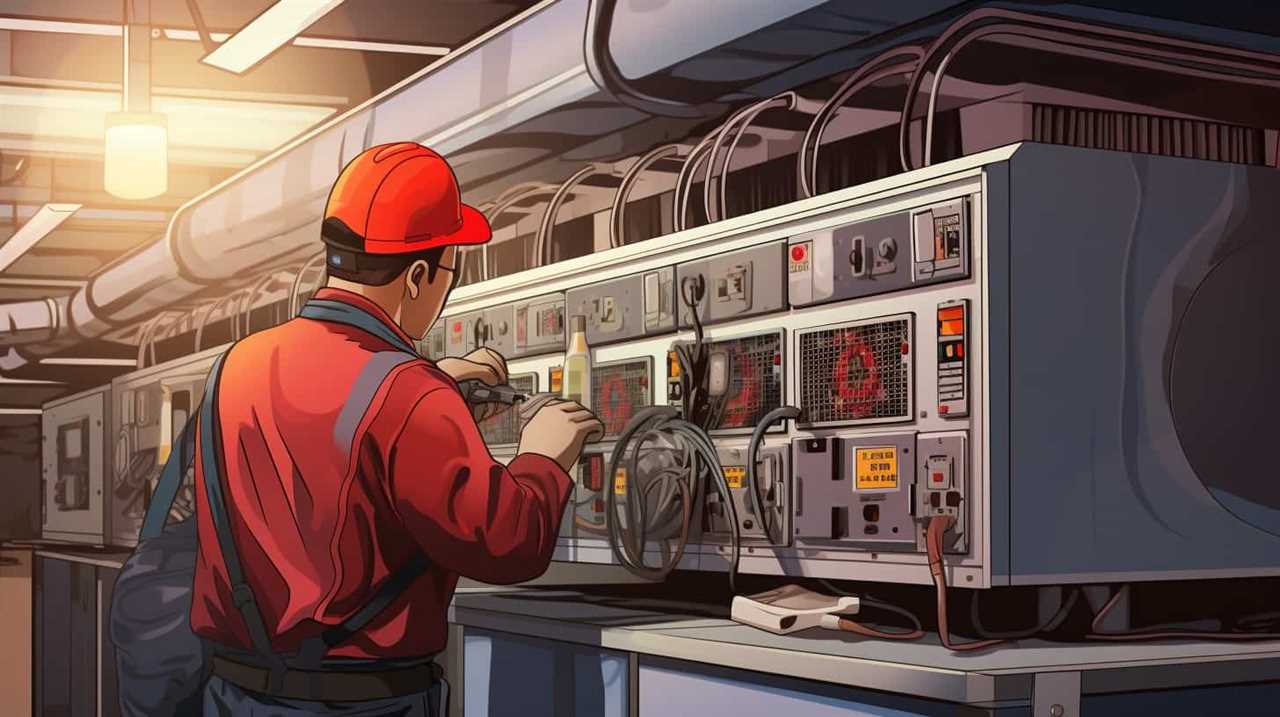
Now, let’s explore the advanced technologies for boosting HVAC heat pump efficiency.
Transition Sentence: Now that we understand the importance of regular maintenance, let’s delve into the advanced technologies that can further enhance the efficiency of HVAC heat pumps.
Advanced Technologies for Boosting HVAC Heat Pump Efficiency
Now, let’s explore how advanced technologies can enhance the efficiency of HVAC heat pumps.
One of the key advancements in boosting efficiency is the use of smart controls. These innovative systems utilize advanced algorithms and sensors to optimize the operation of heat pumps based on real-time conditions. By continuously monitoring factors such as indoor and outdoor temperatures, occupancy, and weather forecasts, smart controls can adjust the heat pump’s settings to maximize efficiency without sacrificing comfort.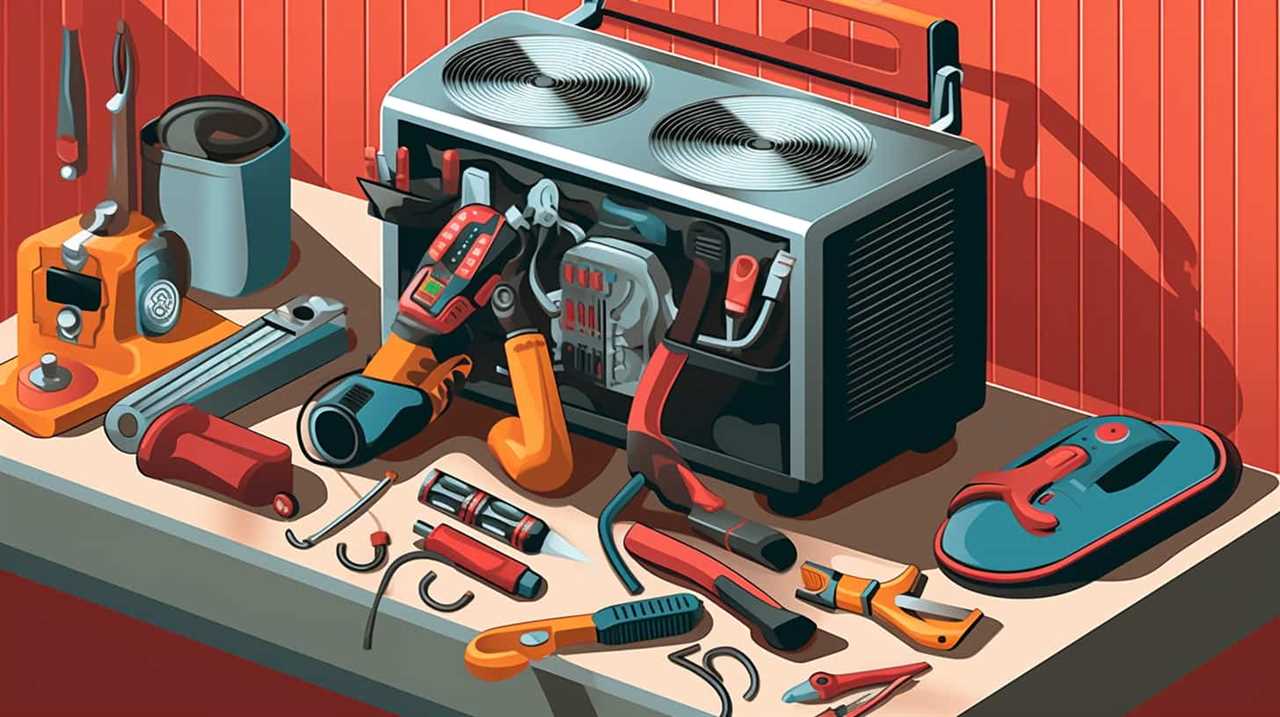
Another technology that can significantly improve HVAC heat pump efficiency is geothermal systems. These systems harness the stable underground temperature to provide heating and cooling, reducing the energy consumption of the heat pump. Geothermal systems also have the added benefit of being environmentally friendly, as they produce fewer greenhouse gas emissions compared to traditional HVAC systems.
Frequently Asked Questions
Can I Install an HVAC Heat Pump Without Proper Insulation and Still Expect It to Operate Efficiently?
Installing an HVAC heat pump without proper insulation can significantly impact its efficiency. Improper insulation can lead to energy consumption, airflow optimization, and size selection issues. Regular maintenance and the use of advanced technologies can enhance efficiency.
How Can I Improve the Airflow in My HVAC Heat Pump System to Enhance Its Performance?
To enhance our HVAC heat pump system’s performance, we must optimize fan speed and improve air circulation. These steps are crucial in achieving maximum efficiency and ensuring the liberation of our system’s full potential.
What Factors Should I Consider When Selecting the Right Size Heat Pump for My Home to Ensure Maximum Efficiency?
When selecting the right size heat pump for our home, we must consider factors like the square footage, insulation, and climate. Ensuring maximum efficiency requires finding the balance between capacity and energy consumption.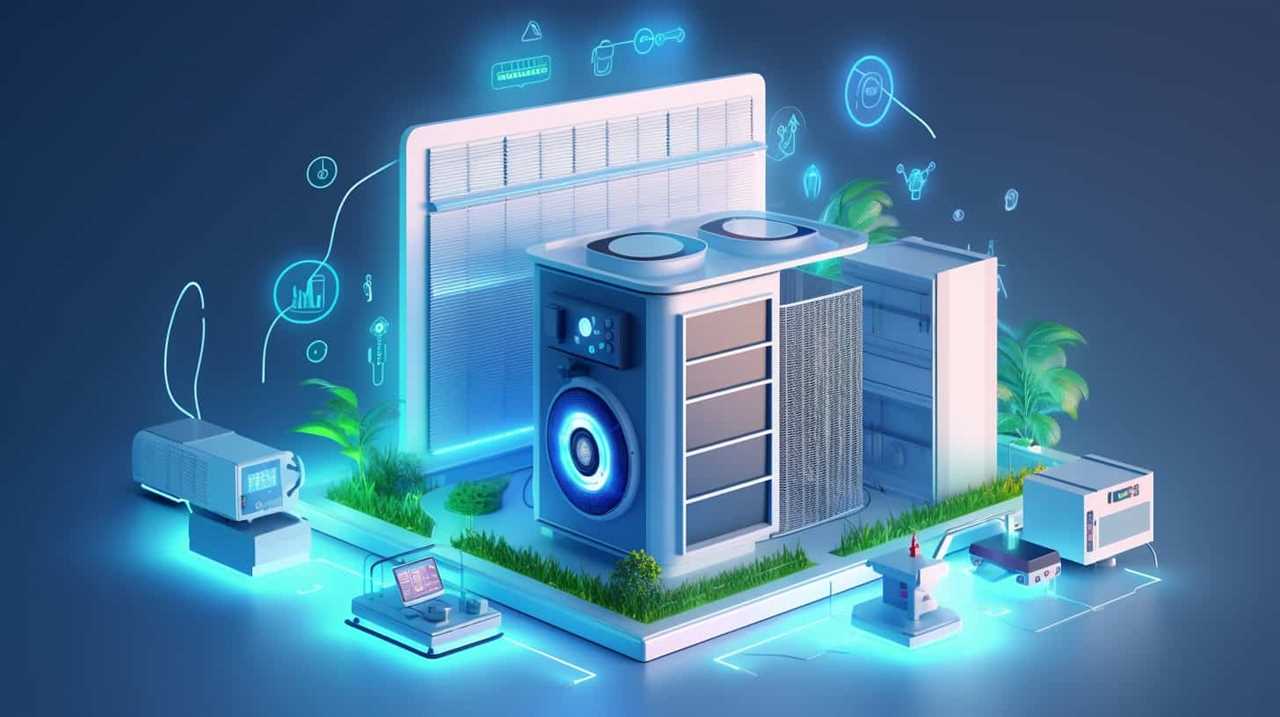
Is Regular Maintenance Necessary for HVAC Heat Pump Efficiency, and if So, How Often Should It Be Done?
Regular maintenance is crucial for HVAC heat pump efficiency. Neglecting it can significantly impact performance. To ensure longevity, we recommend scheduling maintenance regularly. Don’t underestimate the importance of this vital step in optimizing your system.
Are There Any Advanced Technologies Available That Can Further Boost the Efficiency of HVAC Heat Pumps, and How Do They Work?
Yes, there are advanced technologies available that can further boost the efficiency of HVAC heat pumps. These technologies work by optimizing energy usage, improving heat transfer, and incorporating smart controls for optimal performance.
What Are Some Insider Secrets to Maximize the Efficiency of Heat Pumps in HVAC Systems?
Maximizing heat pump efficiency secrets can significantly improve the performance of HVAC systems. Regular maintenance, such as cleaning or replacing air filters, ensures unrestricted airflow and optimal heat transfer. Properly insulating ductwork and sealing gaps reduce energy loss. Setting the thermostat at an appropriate temperature and using programmable features can avoid unnecessary energy consumption. Moreover, scheduling professional check-ups and considering upgrades or eco-friendly refrigerants can further enhance heat pump efficiency.
Conclusion
In conclusion, the efficiency secrets of HVAC heat pumps lie in proper insulation, optimized airflow, selecting the right size heat pump, regular maintenance, and advanced technologies.
These factors work together to enhance performance and maximize efficiency. Just like a well-oiled machine, a well-maintained HVAC heat pump operates smoothly and effectively, providing optimal heating and cooling while minimizing energy consumption.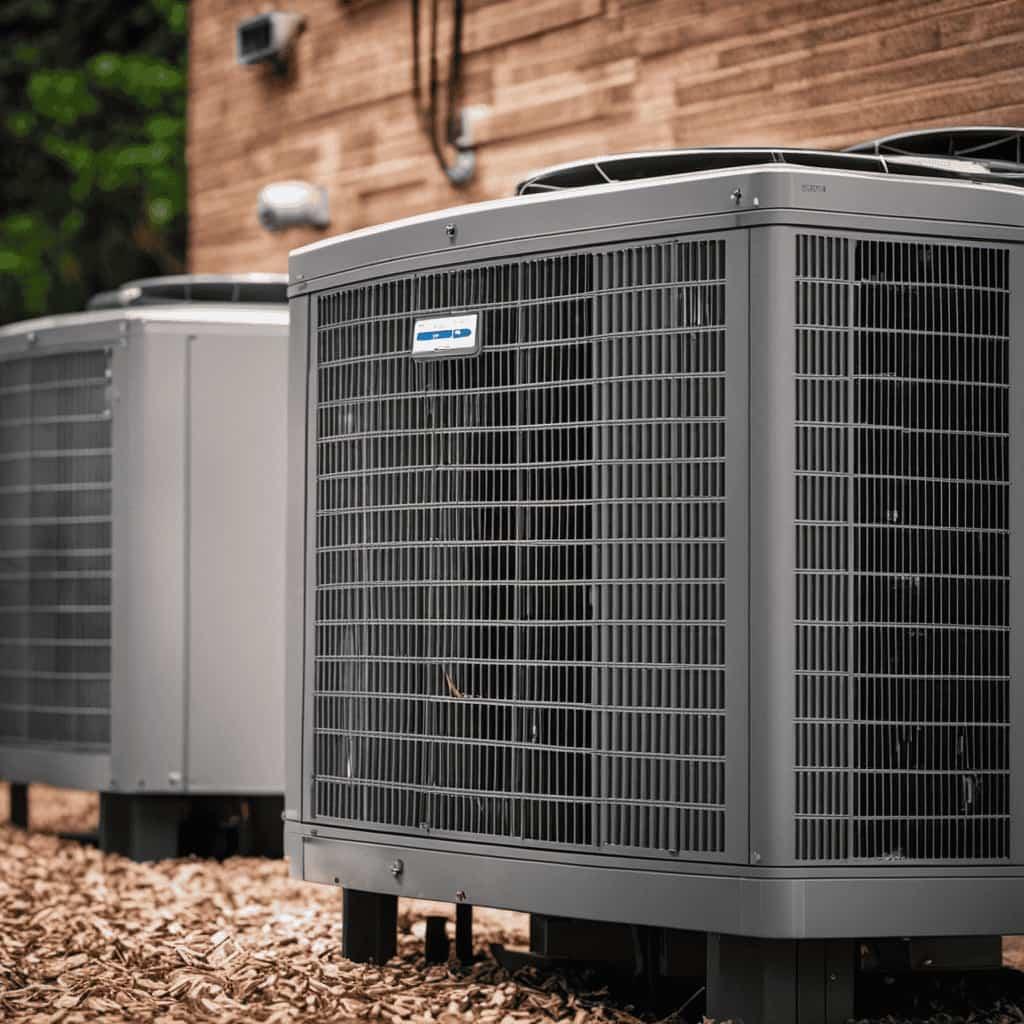
It’s like having a sleek, high-performance sports car that effortlessly glides through any climate.
Climate Control
Are Your Heat Pumps Energy-Efficient? Test With These Tips

Is your **heat pump** truly as energy-efficient as it claims to be? Test its efficiency with the help of these tricks. If you want to save money and reduce your energy consumption, this is the perfect opportunity to see if your **heat pump** is really doing its job. Keep reading to find out more!
We’ll break down heat pump efficiency ratings, explore proper sizing for optimal energy efficiency, and share maintenance tricks to maximize their performance.
Plus, we’ll dive into smart thermostat integration and programming tips, as well as energy-saving strategies for operating your heat pump.
Get ready to unlock the full potential of your heat pumps and enjoy the freedom of lower energy bills.
Key Takeaways
- Efficiency ratings (SEER and HSPF) determine if heat pumps are energy-efficient.
- Proper sizing and regular maintenance maximize energy savings.
- Integration of smart thermostats and programming can improve efficiency.
- Implementing energy-saving strategies such as proper installation, temperature control, and zoning can optimize heat pump operation.
Understanding Heat Pump Efficiency Ratings
We need to understand the efficiency ratings of our heat pumps to determine if they’re energy-efficient. With recent advancements in heat pump technology, there are now more energy-efficient models available on the market.
To compare the energy efficiency of different heat pump models, we can look at their efficiency ratings. These ratings are measured using a metric called the Seasonal Energy Efficiency Ratio (SEER) for cooling and the Heating Seasonal Performance Factor (HSPF) for heating. The higher the SEER or HSPF rating, the more energy-efficient the heat pump is.
When comparing energy-efficient heat pump models, it’s important to consider both the SEER and HSPF ratings to ensure that you’re making an informed decision. By understanding these efficiency ratings, we can choose heat pumps that aren’t only technologically advanced but also energy-efficient.
Proper Sizing for Optimal Energy Efficiency
Our goal is to ensure that our heat pumps are properly sized for optimal energy efficiency. Proper sizing is essential to maximize energy savings and ensure that your heat pump operates efficiently. Here are some energy saving tips to consider when it comes to proper sizing:
Consider the size of your home: The square footage of your home plays a crucial role in determining the size of the heat pump you need. A heat pump that’s too small will struggle to heat or cool your home effectively, while one that’s too large will cycle on and off frequently, wasting energy.
Insulation and air sealing: Proper insulation and air sealing are important factors affecting efficiency. Ensuring that your home is well-insulated and air sealed will help prevent heat loss or gain, allowing your heat pump to work more efficiently.
Ductwork: Properly sized and sealed ductwork is crucial for efficient heat pump operation. Leaky or improperly sized ducts can result in energy loss and reduced efficiency.
By considering these factors, you can ensure that your heat pump is properly sized for optimal energy efficiency.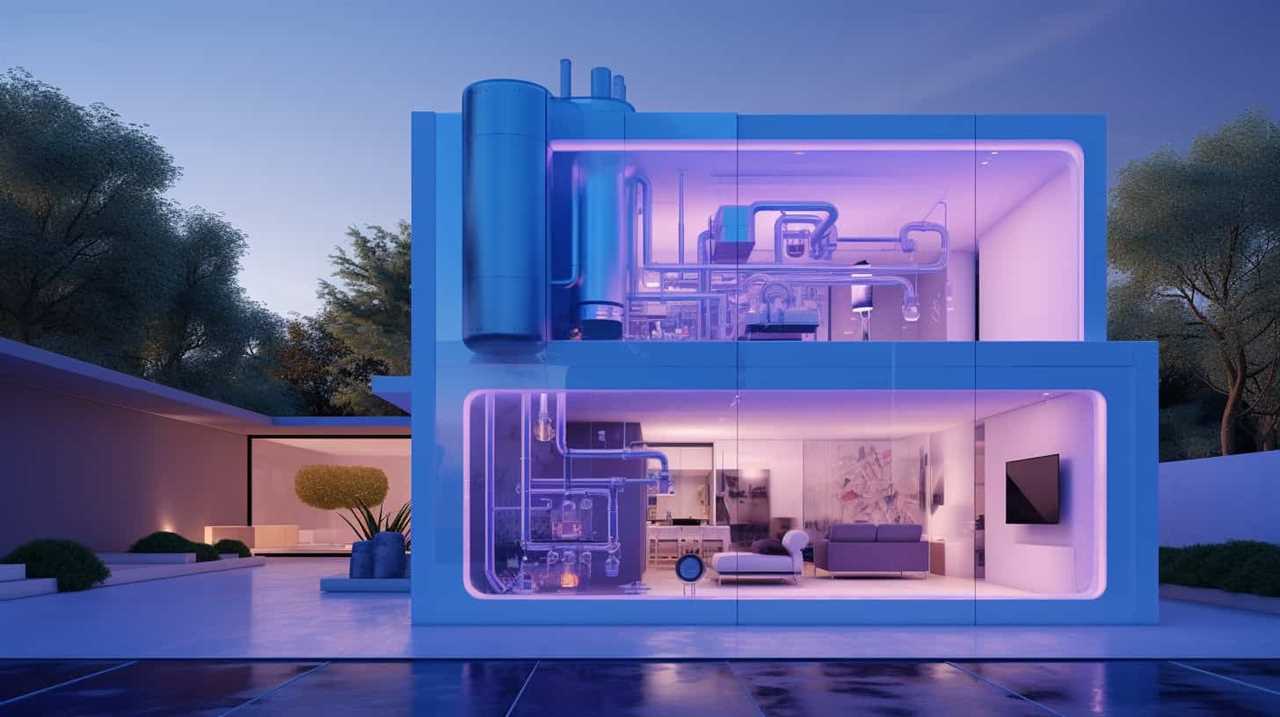
Now let’s move on to the next section, where we discuss regular maintenance to maximize efficiency.
Regular Maintenance to Maximize Efficiency
To ensure maximum efficiency, we should regularly maintain our heat pumps with proper cleaning and inspections. By following a maintenance checklist, we can keep our heat pumps running smoothly and avoid costly repairs.
First, it’s important to clean or replace air filters every one to three months. Clogged filters restrict airflow and reduce efficiency.
Next, we should inspect the outdoor unit for any debris or vegetation that may obstruct airflow. Additionally, we should check the thermostat settings to ensure they’re accurate and adjust them as needed.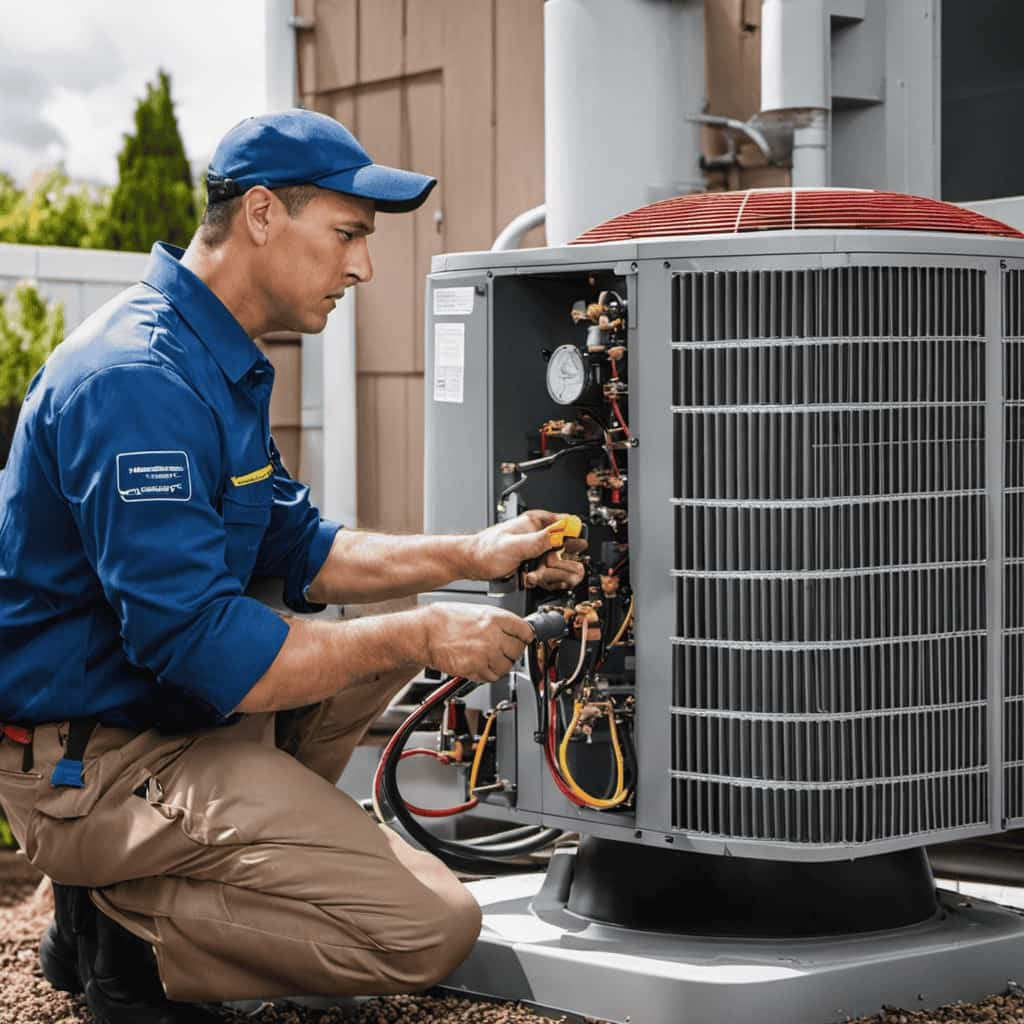
Troubleshooting tips include checking for any unusual noises, leaks, or inadequate heating or cooling performance.
Regular maintenance not only maximizes efficiency but also extends the lifespan of our heat pumps, saving us money in the long run.
Smart Thermostat Integration and Programming Tips
One key tip for integrating and programming smart thermostats is to set a schedule with specific temperature adjustments throughout the day. This allows you to maximize energy efficiency by only using heating or cooling when necessary. Smart thermostats offer a range of energy-saving features to help you achieve this goal.
Here are some tips on how to program your smart thermostat for maximum energy efficiency:
- Take advantage of the thermostat’s learning capabilities by allowing it to adapt to your schedule and preferences.
- Utilize the geofencing feature, which uses your smartphone’s location to adjust the temperature when you’re away from home.
- Use the energy-saving mode, which automatically adjusts the temperature to save energy when you’re not at home.
By programming your smart thermostat effectively, you can reduce energy waste and save money on your heating and cooling bills.
Now, let’s explore energy-saving strategies for heat pump operation.
Energy-Saving Strategies for Heat Pump Operation
To maximize energy efficiency, we can implement various strategies for operating heat pumps.
One important strategy is to ensure proper heat pump installation. This includes proper sizing and positioning of the unit, as well as ensuring proper insulation and sealing of ductwork.
Another energy-saving tip is to set the thermostat to the most energy-efficient temperature. For heating, setting the thermostat between 18-20 degrees Celsius (64-68 degrees Fahrenheit) is recommended, while for cooling, setting it between 24-26 degrees Celsius (75-78 degrees Fahrenheit) is ideal.
Additionally, it’s important to regularly clean or replace air filters to ensure optimal airflow and energy efficiency.
Finally, using a programmable or smart thermostat can help optimize energy usage by automatically adjusting temperature settings based on your schedule and preferences.
Frequently Asked Questions
How Do I Know if My Heat Pump Is Energy-Efficient?
We can determine if our heat pump is energy-efficient by considering factors such as improving insulation and the benefits of regular servicing. This helps us make informed choices and achieve energy savings.
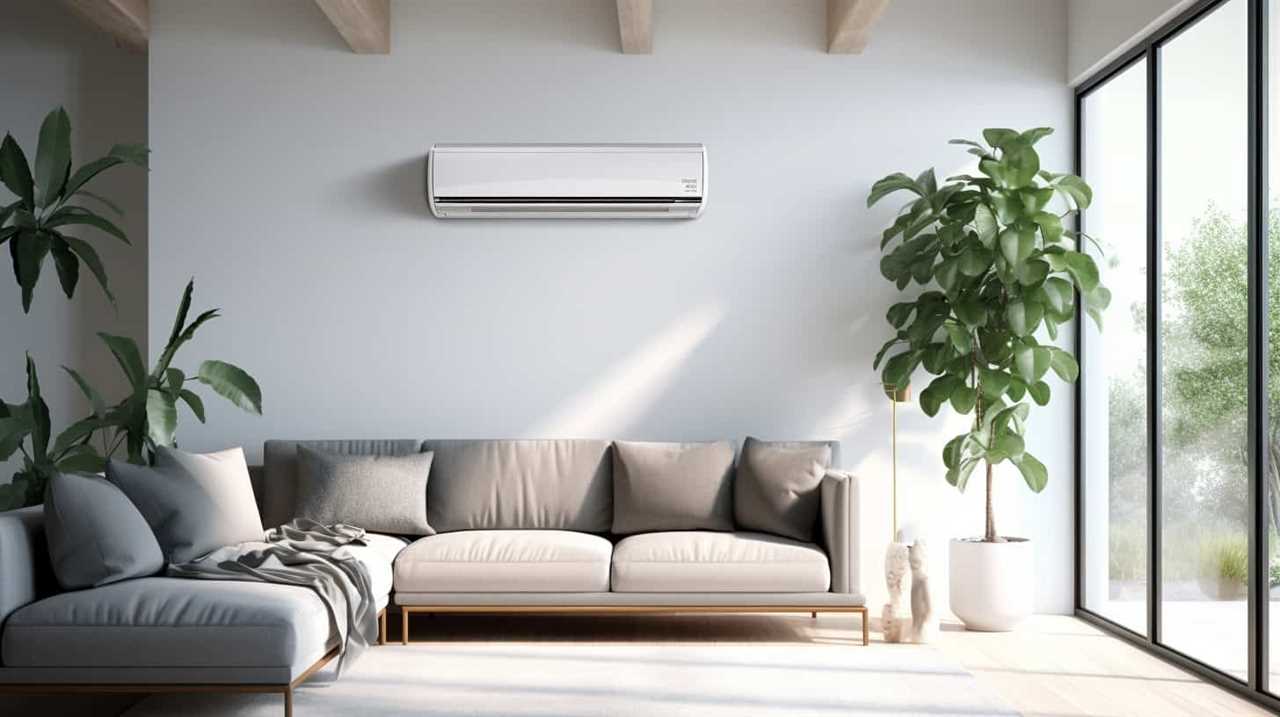
Can I Still Achieve Energy Efficiency With a Heat Pump That Is Not Properly Sized for My Home?
Yes, you can still achieve energy efficiency with a heat pump that is not properly sized for your home. However, it may not operate as efficiently as a properly sized one, leading to higher energy consumption and costs.
What Are Some Common Maintenance Tasks That Can Help Maximize the Efficiency of My Heat Pump?
Heat pump maintenance is essential for maximizing efficiency. Regularly clean or replace air filters, clear debris from outdoor units, and schedule professional inspections. These tips can help ensure our heat pumps operate at peak energy efficiency.
Are There Any Specific Tips for Integrating a Smart Thermostat With a Heat Pump for Optimal Energy Efficiency?
Integrating a smart thermostat with our heat pumps can optimize energy efficiency. We can save more by utilizing energy-saving features such as programmable schedules, remote access, and smart algorithms that adapt to our preferences.
Besides Regular Maintenance and Smart Thermostat Integration, What Other Strategies Can I Adopt to Save Energy While Operating My Heat Pump?
Energy saving habits, such as setting a programmable thermostat and keeping the temperature moderate, can help save energy when operating heat pumps. Additionally, proper insulation techniques can prevent energy loss and increase efficiency.
What Are the Secrets to Ensuring Optimal Heat Pump Efficiency in Eco-Buildings?
Achieving optimal heat pump efficiency in eco-buildings requires a multi-faceted approach. Firstly, proper insulation and airtight construction minimize heat loss or infiltration. Secondly, regular maintenance and clean air filters ensure optimal heat exchange and airflow. Lastly, employing smart thermostat systems that optimize temperature settings and take advantage of renewable energy sources further enhance heat pump efficiency in eco-buildings.
Conclusion
In conclusion, understanding and maximizing the efficiency of your heat pump is crucial for saving energy and reducing costs.
By considering heat pump efficiency ratings, sizing, regular maintenance, and integrating a smart thermostat, you can optimize its performance.
Implementing energy-saving strategies will also help to ensure your heat pump operates at its best.
So, take control of your energy usage and let your heat pump work smarter, not harder, to keep you comfortable all year round.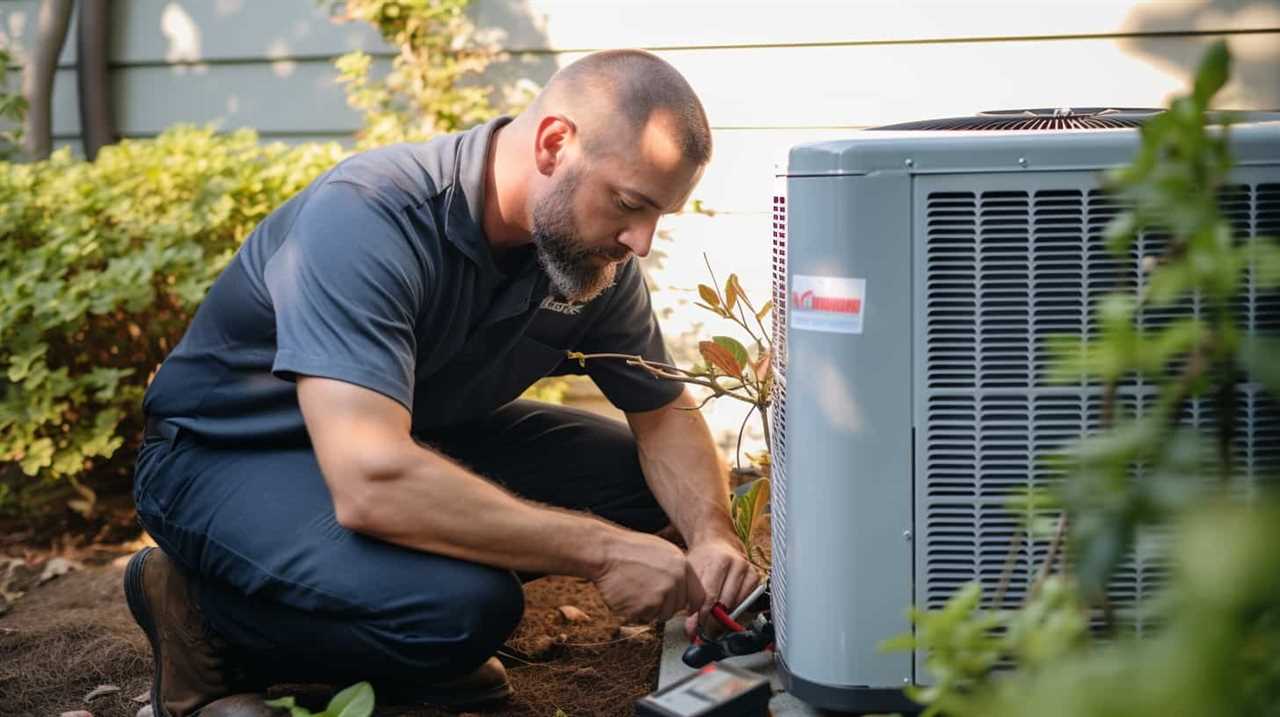
-

 Residential and Commercial Applications3 months ago
Residential and Commercial Applications3 months agoBest Amana Heat Pump Reviews
-

 Thermal Energy Transfer3 months ago
Thermal Energy Transfer3 months agoBreakthroughs in Modern Heat Pump Systems: Thermal Energy Edition
-

 Residential and Commercial Applications3 months ago
Residential and Commercial Applications3 months agoBest Heat Pump
-

 Geothermal Heat Pumps2 months ago
Geothermal Heat Pumps2 months agoUpgrade Your Comfort with Our Efficient HVAC Systems
-

 Geothermal Heat Pumps2 months ago
Geothermal Heat Pumps2 months agoInnovative Geothermal Heat Pump Manufacturers Revolutionize Energy Efficiency
-

 Air Conditioning4 weeks ago
Air Conditioning4 weeks agoExploring Energy-Efficient Air Conditioning Heat Pumps
-

 Thermal Energy Transfer3 months ago
Thermal Energy Transfer3 months agoBoost Your Heat Pump Efficiency: Interactive Guide
-

 Residential and Commercial Applications3 months ago
Residential and Commercial Applications3 months agoBest Portable Heat Pump Heat & AC











